简爱的性格双重
《简·爱》中简·爱双重性格的分析
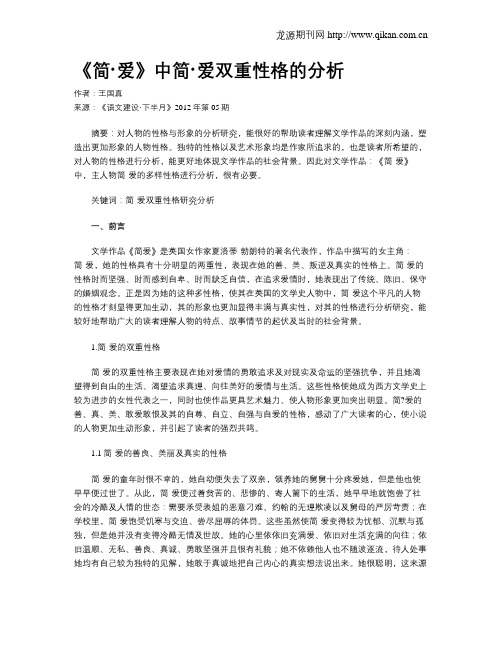
《简·爱》中简·爱双重性格的分析作者:王国真来源:《语文建设·下半月》2012年第05期摘要:对人物的性格与形象的分析研究,能很好的帮助读者理解文学作品的深刻内涵,塑造出更加形象的人物性格。
独特的性格以及艺术形象均是作家所追求的,也是读者所希望的,对人物的性格进行分析,能更好地体现文学作品的社会背景。
因此对文学作品:《简·爱》中,主人物简·爱的多样性格进行分析,很有必要。
关键词:简·爱双重性格研究分析一、前言文学作品《简爱》是英国女作家夏洛蒂·勃朗特的著名代表作,作品中描写的女主角:简·爱,她的性格具有十分明显的两重性,表现在她的善、美、叛逆及真实的性格上。
简·爱的性格时而坚强、时而感到自卑、时而缺乏自信,在追求爱情时,她表现出了传统、陈旧、保守的婚姻观念。
正是因为她的这种多性格,使其在英国的文学史人物中,简·爱这个平凡的人物的性格才刻显得更加生动,其的形象也更加显得丰满与真实性,对其的性格进行分析研究,能较好地帮助广大的读者理解人物的特点、故事情节的起伏及当时的社会背景。
1.简·爱的双重性格简·爱的双重性格主要表现在她对爱情的勇敢追求及对现实及命运的坚强抗争,并且她渴望得到自由的生活、渴望追求真理、向往美好的爱情与生活。
这些性格使她成为西方文学史上较为进步的女性代表之一,同时也使作品更具艺术魅力、使人物形象更加突出明显。
简?爱的善、真、美、敢爱敢恨及其的自尊、自立、自强与自爱的性格,感动了广大读者的心,使小说的人物更加生动形象,并引起了读者的强烈共鸣。
1.1简·爱的善良、美丽及真实的性格简·爱的童年时很不幸的,她自幼便失去了双亲,领养她的舅舅十分疼爱她,但是他也使早早便过世了。
从此,简·爱便过着贫苦的、悲惨的、寄人篱下的生活,她早早地就饱尝了社会的冷酷及人情的世态:需要承受表姐的恶意刁难、约翰的无理欺凌以及舅母的严厉苛责;在学校里,简·爱饱受饥寒与交迫、尝尽屈辱的体罚。
关于简爱双重性格的分析_周双

前言通过《简爱》这部小说,夏绿蒂·勃朗特塑造了简爱这个矮小,地位低微且不引人注意的女性形象。
她有强烈的女性意识,勇敢和对圣洁的爱的不懈追求;她坚强,面对穷困和不幸不屈不挠;她追求自由,坚持真理。
这些特性使简爱在西方文学史上成了先进妇女和具有经久不衰魅力的代表人物。
传统女性的叛逆者是一个罩在简爱头上的闪亮光环,的确,简爱的优秀性格使不同时代的读者激动,但如果我们带着冷静和客观的态度再来审视她,我们会发现在这个闪亮的光环背后有着无法消失的阴影。
简爱有时可悲地误入了一个怪圈,即她自己憎恶但又无法逃脱的怪圈。
在貌似勇敢的外表下,总是潜伏着一个自卑和脆弱的灵魂。
所以分析简爱的正面和负面的双重性格对于我们更好地理解人物具有重要的意义。
简爱的正面性格1、简爱具有真、善、美的灵魂简爱是不幸的。
她是一个被寄养在里德夫人 — 她的残忍,富有的舅妈家里的孤儿。
她的生活是悲惨的,她已完全尝到了这个世界无情和冷酷的滋味。
她的舅妈是苛刻的,她的表兄约翰·里德无端毒打她,这些都没有使简爱变得铁石心肠或世故,她的心仍然充满了爱。
正如圣约翰对简爱的评价一样,“温顺、勤奋、无私、忠实、坚定、勇敢,非常文雅,又非常英勇”(夏洛蒂,2001:601)。
简爱是温顺的但不依附任何人,她从不随波逐流,她对每件事有她自己独特的看法,而且她敢于说出她自己的看法。
当她第一次看到罗切斯特时,尽管他是她的主人,她也没有表现出阿谀奉承,而是真实地回答他的问题。
当罗切斯特问她,“你觉得我漂亮吗”?她没有客套地回答,而是脱口而出,“不,先生”。
简爱的每个回答都是实际和真实的且不失分寸,同时率直和心地纯洁。
所以与简爱谈话后,罗切斯特变得对简爱更有好感和信任了。
她不仅是一个值得信赖的人,而且是一个能看穿人的灵魂的给人启发的特别的妇女。
她发觉罗切斯特是一个“疲倦的野兽”,她的善良的心立即感知或听到他的要求帮助的呼喊,她大胆地走上前去并给予他真挚的爱,使他的冷淡和坚硬外表下的脸有了温暖和友善的笑容。
《简·爱》中简爱性格多面性解析

三 、简爱 性 格 中 的 自信 在 简爱 的人生 中 ,她的性 格也在 不断 地变化 ,从 最开 始 的 自卑到 自强 ,再到最 后 的 自信 ,使 自己的人格 更加健 全 。这 主要体 现在 简爱 与罗切 斯特 的爱情上 。在 与罗切 斯 特 的爱 情 中,简爱 从始 自终都 饱含 的挣扎 ,她认 为罗切 斯 特 的爱 给 了 自己太 大 的压力 ,与她 一直 以来 自强、 自立的 性 格不 同 ,在 进城 买衣服 时 ,罗切斯 特 的爱与大 方让 简爱 觉 得罗 切斯特 是要 用物质 上 的东西套 住她 、给简 爱一种 压 迫感 ,使她 觉得很 不 自在 。罗 切斯特 是爱 简爱 的,他 也想 用 自己的财 富和物 质将 简爱漂 亮 的附庸 品,但 是这是 简爱 所 不 能接受 的,在 很长 一段时 问里 ,简爱 都处 于激烈 的 内 心矛盾 中 ,她 既想 将 自己的身 心全 部献给 罗切斯 特 ,但 是 又理智 的提 醒 自己要掌 握 自己的灵 魂。 当得知 自己深 爱的 罗切斯 特是 有妻 室后 ,简爱最 终选 择 了离 开 ,这 是简 爱与 罗 切斯 特爱 情中 , 自己 自卑心 理 的爆 发 。但是最 后简 爱经 过 艰辛 万苦 ,最终 回到 了爱人 身边 ,这使 她的性 格从 自卑 走到 了 自信 ,形成 了健 全的人 格 。 简 爱 的爱 情 故事 是 整 个 故事 的亮 点 ,体 现 出 简 爱 的 多面性 性格 以及 自我成 长的阶 段 ,在故事 中展示 出 了一个 理 智 、客观 的女主 人公 的形 象 ,在 陷入深 爱中 ,也要 时刻 保 持清 醒 ,主导 自己的灵魂 ,也正 是她 的 自立 、 自强 换取 了最 后 的地 位 。“ 沦为 奴 婢和 男子 们 的玩物 的 危 险使她 畏 惧。 ”口 简 爱要 求继 续作为 家庭 教师保 持 自 己的经 济独 立 , 在 婚礼 上 当梅 森先 生说 出罗切 斯特 的发妻 就是 阁楼上 的疯 女人 时,简 爱受 到 了巨大的伤 害 , 自己的爱与被 爱 的权利 被 夺走 ,在 理智 与感情 、尊严 与爱 情之 间 ,她依 然选 择 了 理智 与尊严 ,最 终 出走 。这将 简爱 的反叛 精神表 现 的最高 峰,也 是她在 追求 爱情道 路上 的理 智的最 高峰 。从简 爱身 上我 们 看 到 了 一个 自强 、 自立 、 自信 、 自重 的 新 女性 的
伦理学视角下简爱多重性格分析

伦理学视角下简爱多重性格分析《简·爱》是英国作家夏洛蒂·勃朗特的代表作,被誉为英国文学史上的经典之一。
小说通过女主人公简·爱的成长经历,展现了社会等级制度、性别歧视、爱情与自由等复杂主题。
简·爱这一角色的多重性格也为读者提供了深刻的思考。
从伦理学的角度来分析,简·爱的多重性格体现了人性的复杂性和道德选择的挑战。
本文将对《简·爱》中主人公简·爱的多重性格进行分析,探讨她在伦理层面上的行为和抉择。
简·爱是一个积极追求爱情和自由的女性。
在小说中,简·爱对爱情和自由的追求一直是她内心的主要动力。
她拒绝了罗切斯特先生的爱情表白,因为她不愿意成为他的情妇,而是渴望成为他的平等伴侣。
简·爱对爱情和自由的坚持体现了她对道德价值的追求,她不愿意妥协自己的原则和尊严,选择了独立和自由。
在当时的社会背景下,这样的抉择是不容易的,但也正是通过这样的抉择,简·爱展现了自己真正的人格品质,体现了她对于爱情和自由的道德选择。
从伦理学的角度来看,简·爱的抉择是在追求自己的幸福和尊严的基础上,而不是纯粹的个人私欲满足。
这种积极追求爱情和自由的品质也为现实生活中的人们提供了反思,使我们重新审视自己的爱情观和自由观。
简·爱是一个勇于奋斗和追求正义的女性。
在小说中,简·爱在面对社会的压迫和不公时,不是选择逃避,而是选择了积极的抗争和奋斗。
她在罗切斯特先生的家中遭受了不公和伤害,但她没有被压倒,而是选择了离开他的家,选择了独立和自由。
她在后来的生活中也始终坚持追求自己的梦想和幸福,最终实现了自己的人生价值。
简·爱的勇于奋斗和追求正义的品质反映了她对于伦理道德的关注和坚持。
在现实生活中,也需要像简·爱一样,坚持自己对于正义和幸福的追求,敢于直面挑战,勇敢奋斗。
简·爱的勇敢与追求也是对道德选择的一种呼吁和告诫,她的经历和抉择都对我们有着深刻的启发和反思。
简爱的性格在不同时期有很大的变化
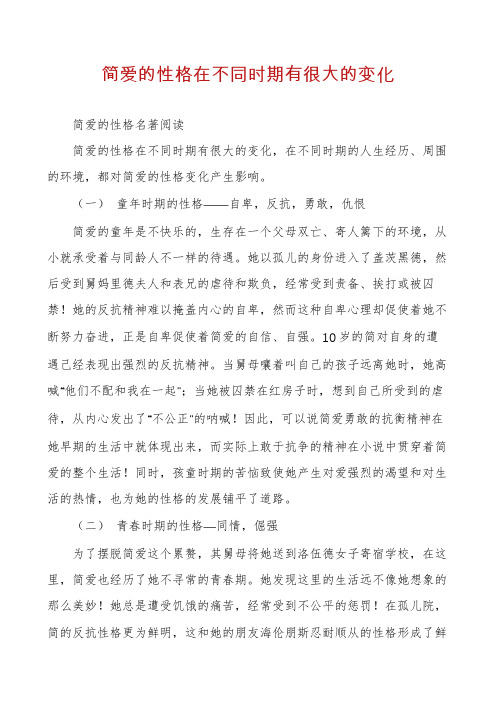
简爱的性格在不同时期有很大的变化简爱的性格名著阅读简爱的性格在不同时期有很大的变化,在不同时期的人生经历、周围的环境,都对简爱的性格变化产生影响。
(一)童年时期的性格――自卑,反抗,勇敢,仇恨简爱的童年是不快乐的,生存在一个父母双亡、寄人篱下的环境,从小就承受着与同龄人不一样的待遇。
她以孤儿的身份进入了盖茨黑德,然后受到舅妈里德夫人和表兄的虐待和欺负,经常受到责备、挨打或被囚禁!她的反抗精神难以掩盖内心的自卑,然而这种自卑心理却促使着她不断努力奋进,正是自卑促使着简爱的自信、自强。
10岁的简对自身的遭遇己经表现出强烈的反抗精神。
当舅母嚷着叫自己的孩子远离她时,她高喊“他们不配和我在一起”;当她被囚禁在红房子时,想到自己所受到的虐待,从内心发出了“不公正”的呐喊!因此,可以说简爱勇敢的抗衡精神在她早期的生活中就体现出来,而实际上敢于抗争的精神在小说中贯穿着简爱的整个生活!同时,孩童时期的苦恼致使她产生对爱强烈的渴望和对生活的热情,也为她的性格的发展铺平了道路。
(二)青春时期的性格―同情,倔强为了摆脱简爱这个累赘,其舅母将她送到洛伍德女子寄宿学校,在这里,简爱也经历了她不寻常的青春期。
她发现这里的生活远不像她想象的那么美妙!她总是遭受饥饿的痛苦,经常受到不公平的惩罚!在孤儿院,简的反抗性格更为鲜明,这和她的朋友海伦朋斯忍耐顺从的性格形成了鲜明的对比。
海伦朋斯虽遭迫害却信奉“爱你的仇人”,在宗教的麻痹下没有仇恨,只有逆来顺受。
而简对冷酷的校长和摧残她们的教师深恶痛绝。
她对海伦说:“假如她用那根条子打我,我要从她手里把它夺过来,并且当面折断它。
”充分表露了她不甘屈辱和不向命运妥协的倔强性格。
同时对于海伦的遭遇和死亡简爱流露出很大的同情。
作为一个孩子,她总是用严肃的眼光简爱的性格名著阅读盯住他们的行为和语言,对他们的虐待和欺凌充满了仇恨!(三)成年时期的性格―敢爱,真挚当简爱成年之后,在桑菲尔德庄园成为了Adele的家庭女教师。
对《简爱》中人物简爱性格的分析
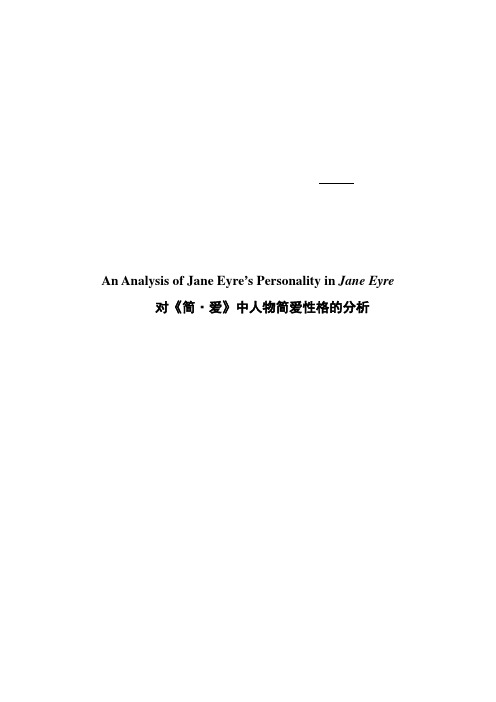
An Analysis of Jane Eyre’s Personality in Jane Eyre 对《简·爱》中人物简爱性格的分析摘要《简爱》是英国著名的作家夏洛蒂·勃朗特根据她的自身经历写的一部小说,也是她的成名作。
它在英国文学史上占有重要地位。
小说所写的是一位坚强独立的女性,她追求真爱,平等,是女性的楷模。
作者在其作品中成功的塑造了英国文学史中第一个对爱情,生活,社会以及宗教采取了独立自主积极进取态度和敢于斗争,敢于争取自由平等的女性形象—简·爱。
简·爱鲜明的性格特征给广大读者留下了深刻的印象。
这篇论文主要结合简·爱的生活经历,分析她正面和负面的双重性格特征,使人们更深地了解《简爱》及其现实意义。
旨在给生活在现代女性提出建议,即使现在女性地位有所改善,但由于保守的习俗根深蒂固,女性应该更勇敢,更锲而不舍的反抗那些不合理习俗。
关键词:夏洛蒂·勃朗特;简·爱;双重性格安阳师范学院人文管理学院本科毕业论文AbstractJane Eyre was written in 1846 by the famous British writer Charlotte Bronte, which was based on her own experiences. It is also her masterpiece. The novel enjoys a high appraisal in English literature. The novel depicts an independent and tough woman who pursues equality and true love. The author successfully portrayed a great female image—Jane Eyre. The bright characters of the heroine give readers a deep impression.This paper gives an analytical study of dual characters of Jane Eyre, so as to help people understand Jane Eyre deeper and comprehend its realistic significance more. The author of this thesis aims to gives advice to modern women, although women’s status is improved now, the conservative conventions is deep and ingrained root. Women should have the courage to fight against the conservative conventions.Key Words: Charlotte Bronte; Jane Eyre; dual CharactersContents摘要 (I)Abstract (II)1. Introduction (1)1.1 Introduction to Charlotte Bronte (1)1.2 Introduction to Jane Eyre (1)2. An Analysis of the Personality of Jane Eyre (2)2.1 Jane Eyre’s Positive Personality (3)2.1.1 Jane Eyre’s Independence (3)2.1.2 Jane Eyre’s Pursuit of Equali ty (4)2.1.3 Jane Eyre’s Pursuit of Liberty (4)2.1.4 Her Pursuit of True Love (5)2.2 Jane Eyre’s Negative Personality (6)2.2.1 Jane Eyre’s Self-abasement (6)2.2.2 Jane Eyre’s Worship of Traditional Marriage (7)3. Causes of Jane Eyre’s Personality (8)3.1 Causes of Jane Eyre’s Positive Personality (8)3.1.1 Influence of Jane Eyre’s Sufferings (8)3.1.2 Influence of Social Background in Victorian Age (8)3.2 Causes of Jane Eyre’s Negative Personality (8)3.2.1 Influence of Jane Eyre’s Plain Appearance (9)3.2.2 Influence of Charlotte Bronte (9)4. Conclusion (10)Bibliography (11)Acknowledgments (12)1.Introduction1.1 Introduction to Charlotte BronteCharlotte Bronte (April 21, 1816~March 31, 1855) is an English writer, she is famous for her novel Jane Eyre. Jane Eyre is written in 1847, Charlotte Bronte is sister of Anne Bronte and Emily Bronte. The three sisters are as famous for their tragic, short lives as for their novels. In the past 40 years Charlotte Bronte’s reputation has risen rapidly, and feminist criticism has done much to show that she was speaking up for oppressed women of every age. Another typical work of Charlotte is Shirley, Shirley described the workers’ movement in 19 century. Charlotte was born in the north of England, she is the daughter of an Anglican clergyman. The Anglican clergyman moved with his family to Haworth amid the Yorkshire moors in 1820. After their mother and two eldest children died, Charlotte was left with her sisters Emily and Anne and brother Branwell to take care of their father, their religious, strict aunt. Charlotte attended the Clergy Daughter’s Sc hool at Cowan Bridge in 1824. Because of the harsh conditions, she returned home next year. In 1831, She went to school at Roe Head, at there Charlotte Bronte worked as a teacher. However, she fell bad, suffered from melancholia, and gave up this post. Cha rlotte’s attempts to earn her living as a governess.The collection of poems, Poems by Currer, Ellis And Acton Bell(1846), which Charlotte Bronte wrote with her sisters, sold only two copies. By this time she had finished a novel, The Professor, but during her lifetime, it never found a publisher. Undeterred by this rejection, Charlotte began Jane Eyre, which appeared in 1847, Jane Eyre became an immediate success. Her works are all about some lonely and neglected young woman with a fierce longing for love, understanding and a full, happy life.1.2 Introduction to Jane EyreJane Eyre has high appraisal in literature history. It is the typical work of Charlotte Bronte. This work narrates Jane Eyre’s life experiences.Jane Eyre is an orphan, when she was very little, she is ill-treated. But at last, she became anindependent woman. When she was born, she is unlucky. She was sent to her uncle’s family because she lost her parents. In the family, she was ill-treated. She is timid, little, ugly and is a “little thing”. She has no clear identity. The power presses her, strangles her personality. Although the reality is cruel, Jane Eyre is not destroyed by it. And, she learns how to live, she becomes strong. She struggles against the pressure in life and the cruel, she take her courage to struggle with the reality. She shows a completely new woman image. She is very brave, independent, calm and ration.This paper also presents Jane Eyre’s viewpoint about love. Jane Eyre is very poor, she has nothing but the power of individual spirit. She thinks love must be based on equality. Love needs equality. Jane Eyre denies the inequality of marriage. Jane Eyre pursues equality on social status, economy and personality. She believes in equality between men and women.2. A Detailed Analysis of the Personality of Jane EyreThe Industrial Revolution opened up a new world for lower-class women, offering them new factory jobs. But it did not do much good for the middle class. A single woman at this economic level still could not have a good job, there are only one job for these woman: governess. Jane Eyre is pretty attractive. Jane Eyre is a kind girl with soft heart who always brings love to people around her, she helps Helen Burns and Mr. Rochester when they are in trouble. Her self-respect is related to her life environment. She is plain but aspiring, her figure is small but her soul is huge. In Jane Eyre’s opinion, everyone is the same at God’s feet. Though there are differences in property, appearance and also status, all the human beings are equal in personality. Jane Eyre is exposed to a bad environment but continuously and fearlessly struggling for her ideal life. Jane shows her determination in pursuing her self-esteem and independence at every stage of her life, both in struggling with social pressure and resisting the temptation of passion and love. And Jane is a straight person, she never flatters others, for example, she hates her aunt, so she told her the truth and when Mr. Rochester asked her if he is handsome, she answered “no”without any hesitation.Jane is tolerant, although her aunt hurt her deeply, she can forgive her aunt. She has sense and morality, when she knows Mr. Rochester was a married man, she leaves Mr. Rochester resolutely. Jane is strong and brave, she is very kind. Her idea of equality and self-respect impress us so much and let us feel the power inside her body. Under the pressure of life, Jane Eyre is hard-working. She is wisdom. Although Jane Eyre has little figure, she never gives in on her way. She is very loyal to her true love. She is the master of her own life. She deserves to be loved.Jane Eyre has the character of female consciousness. She is a small, plain-faced orphan-girl, but she is smart, independent and passionate. In the novel, Jane Eyre’s bright characters give readers a deep impression.On the one hand, Jane Eyre is calm and independent. On the other hand, she is self-abased and conventional.2.1 Jane Eyre’s Positive PersonalityJane is independent and brave. After she knows she has fallen in love with her host, whose condition differs from hers deeply, she thinks that people are equal spiritually. Her courage to love a rich gentleman is like a beggar hopes to be the king.2.1.1 Jane Eyre’s IndependenceBeing an orphan, she is poor and lonely in the world. She seems doomed to have a life of failure. Her aunt Reed and her cousins treat her cruelly as an alienation. They deepen her determination of rebellion. She realizes that she will never find a true sense of home, she will never find a true sense of community, she feels the need of belonging, to find “skin,” or at least “kindred spirits.”The “red-room” life deepens her courage in resisting her aunt’s unfair punishment, which foreshadows Jane’s independence or rebelliousness. The experience at Gatehead makes her realize that she needs equality and freedom. The unfortunate experience at Gatehead makes her realize it is not necessary to fear authority. As an orphan, she was sent into Gateshead Hall of her uncle Mr. Reed. However, after Mr. Reed’s death, her aunt, Mrs. Reed treats her cruelly. Jane suffers lots of abuse, her cousins also found pleasure in teasing and mocking her. Though living under this circumstance, Jane did not surrender. After a series of sharp conflicts with the families, Jane was sent to Lowood school, a school for orphans. Jane studied as a student for 8 years and worked as a teacher for 2 yearsthere. Later, she accepted a governess position at a manor called Thornfield, where she taught a lively French girl. She rarely gained love and warmth from the family and lived her childhood unhappily. In a word, Jane Eyre starts her life without parents, money and good family environment.2.1.2 Jane Eyre’s Pursuit of EqualityJane Eyre insists on pursuing equality throughout her whole life. She struggles to overcome oppression and achieve equality. Because of the class hierarchy, she has to fight against those who believe women are inferior to men. There are three people who threaten her, Mr. Brocklehurst, Edward Rochester, and St John Rivers, who want to keep Jane Eyre in a submissive position, make her unable to express her thoughts and feelings. In her quest for independence, she has to escape Brocklehurst, reject St John and comes to Rochester after ensuring that they may marry as equals. She spends at Moor House during this time. She doesn’t depend on Rochester for love, she can be financially independent. Finally, Rochester is bind, Jane becomes his wife. Women are supposed to be ordinary, they need to stay at home. If they want to do more or learn more than custom has pronounced necessary for their sex, they are not allowed. After a long time, Jane becomes a maternal, independent, sensitive and artistic young women. Jane refused to marry to Rochester because she understands she must forfeit her independence in the unions and marry Rochester when she has attained financial independence to maintain a marriage of equality.2.1.3 Jane Eyre’s Pursuit of LibertyIn order to lead a life of independence, Jane Eyre worked at Thornfield Hall. She was looked down upon by the rich ladies of the society, but Jane never despised herself. She was proud of her work. Rochester was attracted to her qualify, strong personality, courage, and independence, he even fell in love with her. But Jane makes it clear to him, “Do you think, because I am poor, obscure, plain, and little, I am soulless and heartless?” she cries, “You think wrong. I have as much soul as you—and full as much heart! And if god had gifted me with some beauty, and much wealth, I should have made it as hard for you to leave me, as it is now for me to leave you. I am not talking to you through the medium of custom, conversation, nor even ofmortal flesh—it is my spirit that addresses your spirit ;just as if both had passed through the grave, and we stood at god’s feet—equal,--as we are!” (Charlotte Bronte, 2006:9). Equality is what she strives for, and in him she strives for. Without Rochester, her material life can’t be affected, but she can not part from Rochester in spirit and emotion. Jane loves Rochester, she feels they are kind by nature, Rochester is the first person to offer Jane lasting love. Rochester offers Jane a real home. Rochester is superior to Jane socially and economically. In Victorian period, men were considered to be naturally superior to women. Jane decides to leave Rochester after she knew Rochester has a mad wife, she doesn’t want to be his mistress, she doesn’t want to lose her dignity.In Victorian era women was arranged by wealth and class. Jane’s independence could have been considered a huge accomplishment. If Jane had stayed at Lowood, she could have never met Rochester. In a Marxist point of view Jane’s separation from her social structure, marked by her unique boldness, helps her succeed over the average woman in Victorian era. If Jane had stayed at Lowood, she would have never met her emotional success. She is searching for the strong bonds in family. Jane naturally could not be confined to a dull place. In a Marxist point of view, the average woman would be content with her position in life. She had food and a roof over her head. Before this, she had nothing. Jane’s idea of success led her to Rochester and the love she never had. Jane’s unique traits of boldness, courage, strong will all help her succeed in her time. But Charlotte Bronte wants to express the restrictions upon women during that time. By expressing these hardships she writes a work and defines the hardship of her social structure due to the economic base of its time. Although Victorian era has long since passed, Jane Eyre’s character traits have not. In each person, we can find strong will, courage, and boldness. Though her story, her traits still live on, and still lead to success.2.1.4 Her Pursuit of True LoveLove is the most beautiful thing in the world. There is no difference in front of true love. True love should not be measured by social status, fortune, age, rights. Most people like to pursue very romantic love. But I think, it is very important for a manand woman to have the same aim and find a perfect response. Shakespeare said, “The course of true love never did run smooth.” (Shakespeare,1996:31) Jane and Rochester find true love after a lot of sufferings.When Jane finds her falls in love with Mr. Rochester, who has wisdom and rich experience, she is not afraid. Jane Eyre and Mr. Rochester have large social status disparity, but Jane dares to love Mr. Rochester. She believes everyone is equal. Mr. Rochester does not know whether Jane loves him, so he pretends to marry a rich woman. And the woman is very noble. When Jane hears this news, she is very angry. She pursues equality, not wealth; She pursues the equal combination of two hearts, not position. After she knows Mr. Rochester has a wife, she leaves Thornfield, but she finally goes back to Thornfield. At that time. Mr. Rochester has bad health and becomes blind, she still loves to accompany him.2.2 Jane Eyre’s Negative PersonalityOn the one hand, Jane Eyre is calm, rational, and independent. On the other hand, she is self-abased and conventional.2.2.1 Jane Eyre’s Self-abasementSelf-abasement is a normal psychology for every person. To some extent, it can make us have a clear judgment on ourselves. Self-abasement is not frightening. The vital thing is how we defeat it and walk out of its shadow. But Jane Eyre can not go out of this shadow, it surpasses the normal degree, it becomes a fixed factor in her character. It always perplexes her.Jane Eyre feels she is not good-looking, she feels tiny and low about her out-looking. It shows that she is self-contemptuous. In Thornfield, When Rochester shows her his love she shows self-contemptuous again. What makes her suspect Rochester’s love is her self-abased mood. When she faces Miss Ingram, Jane is hesitant. Miss Ingram is beautiful and wealthy. Jane Eyre compares herself with Miss Ingram, then makes a conclusion “He can not love me forever”. Jane is not brave enough, she pursues the equality. After Jane and Rochester fall in love with each other and get ready to got married, she unfortunately come to know that Rochester had got a legal wife, she seems to be the shadow following Rochester, and it leads toRochester’s moodiness all the time. At that time, the wedding is canceled. Rochester wants Jane to accompany him to the south of France, at France they would live as husband and wife, though they could not be married. Although Jane still loves Rochester, she refuses. She refuses to betray the God-given morals and principles she has always believed in—“I care for myself. Not having a friend more as being lonelier, the more wanting self-respect, as not having person help, our more” (Charlotte Bronte, 2006:11). Most of us think the sentences express Jane as the master of herself, and she is very independent. But I think, the action shows her inactive attitude towards her love. For the future, she is not confident. She loves Rochester but she is not brave enough. She is not brave to express her love, the love is not strong enough to let her fight against convention and secular vision. So, she chooses to flee from there.Knowing Rochester’s misfortune, Jane decides to stay with him forever. But Jane still chooses to leave when Rochester needed her most. So, we can see, Jane is not brave to fight for her love. She compromises to the traditional concept of marriage. Jane’s love is controlled by other things and other people.2.2.2 Jane Eyre’s Worship of Traditional MarriageJane resists to put her marriage on the religious. She can’t give up her deep love to Rochester, she can’t stand a marriage without love. Her love for Mr. Rochester has nothing to do with appearance, prosperity, social status and other such things, just for love. Her love needs courage to break traditional concepts. She dares to speak out her love for Mr. Rochester but gives up the love for personal quality.But Jane Eyre yields to traditional marriage which lets us feel disappointed. Jane thinks Bertha Mason represents the will of law. What she needs to do is to give up. She has no chance to strive for love. Because of her worship of traditional marriage, she has no courage to pursue her love. She decides to leave Rochester. At the end, she becomes the loyal defender of traditional marriage.3. Causes of Jane Eyre’s Personality3.1 Causes of Jane Eyre’s Positive PersonalityJane has a plain character, she is attractive. She is a kind girl with soft heart. She pursues equality and the equal combination of two hearts. She is poor but aspiring, small in figure but huge in soul.3.1.1 Influence of Jane Eyre’s SufferingsJane Eyre is an orphan, since early childhood, she feels deserted, exiled. The cruel treatment she receives from her cousins and her Aunt Reed makes her feel lonely. Being worried about not going to find a true sense of home, Jane feels the necessity of finding a home. Then, Jane is sent away to Lowood School, at there she wants to enrich herself with knowledge and learns practical skills for women in that age. In order to cover her shortage, Jane smartly endeavors to gain more aesthetic female accomplishment, which includes speaking French, playing the piano. In the end, Jane is almost versatile.3.1.2 Influence of Social Background in Victorian AgeIn Britain, Victorian time is a great era. Victorian spirit is still influencing Britain until now. The former British prime Minister, Margaret Thatcher has ever said that Victorian value is the value of British prosperous age. Because the prosperity of the society, the release of productive forces, those middle class has leisure time, so they can arrange their time. People are influenced by the leading ideological trend of utilitarianism, seeking the spirit of universal fraternity and democracy.In Britain, at that time, the only occupation for women was teaching as school mistresses or serving as governesses in private families. In Victorian time, the moral code for women was that they should remain ignorant. So, in the novel, young girls, who went out alone in the world and suffered various trials, temptation and miseries, had been popular in England for over a century. Charlotte Bronte and Jane Eyre challenged the traditional discrimination to women.3.2 Causes of Jane Eyre’s Negative PersonalityJane Eyre’s plain appearance and the author’s personal experience lead to JaneEyre’s negative Characters.3.2.1 Influence of Jane Eyre’s Plain AppearanceAppearance is very important for woman. When people evaluate a woman, appearance is very important. Jane Eyre is weak and short. In childhood, Jane Eyre is deeply self-abased for her appearance. When she sees her beautiful cousins, she thinks “I know that had I been a sanguine, brilliant, careless, exacting, handsome, romping, child-though equally dependent and friendless-Mrs.Reed would have endured my presence more complacently; her children would have entertained for me more of the cordiality of fellow-feeling; the servants would have been less prone to make me the scapegoat of the nursery.”(Charlotte Bronte, 2006:44) She thinks the reason why people do not like her is because her appearance. It makes her feel more self-abased. When Mrs.Read punishes her, she thinks it is very natural. She thinks Ingram is very beautiful. She feels self-abasement. She thinks she cannot complete with Ingram. She hides herself.3.2.2 Influence of Charlotte BronteJane Eyre has lots of similarities with Charlotte Bronte. Her experiences are the mirror of Charlotte Bronte. They have similar family background, similar boarding school experiences, similar feminism, similar vision of love and similar appearance. They are both normal, Jane is an orphan, Charlotte Bronte’s mother died when she was very young. They both live their life by working as a governess. In a word, Jane Eyre reflects Charlotte Bronte in many ways. She is eager to have a warm family even though she had experienced so many difficulties before that. She puts her experiences to Jane’s growth to make her strong and tough, letting her overcome hardship before she got her happiness. Jane Eyre’s life was Charlotte’s ideal life. Though there are a lot of sufferings, there are still a happy ending waiting for her, which is the reward of her determination.4. ConclusionJane Eyre is the famous work of Charlotte Bronte. Jane is such a great woman, for she dares to challenge people’s traditional opinions. Her so many beautiful personalities make her a charming woman. From a weak small orphan girl in lower class. Jane Eyre ultimately gains a happy life. It is seldom is British society as that time, especially she owns nothing, has a plain appearance. The success she has gained wholly decided by her hardworking and lasting pursuit.In Jane’s path of life, Jane dares to rebel and struggle for equality, freedom and happiness. When Jane knows Rochester has already got married, she is able to control herself better than many men who would n ever be able to. Jane does not want to be Rochester’s mistress. Although Jane gets heavy hit, but she leaves resolutely, poor, lonely and homeless. She thinks she can live by herself. She is not only realistic but also ideal, self-confident but shy before strangers. Charlotte Bronte gives Jane a character that full of contrasts, and Jane Eyre really has a complex character. She learns how to live because of her childhood’s environment. And Jane Eyre’s growing experience makes her wise and smart. She thinks self-respect is necessary. Jane Eyre denies the inequality of marriage. She pursues the equality between man and women. Though social condition influenced her, she has some negative characters—too devout, self-contemptuous. She is still a great woman. Although Jane Eyre is a girl with little figure, she is strong inside. She never gives in to pursue her true love.Bibliography[1] 廖素清.An Analysis of Jane Eyre’s Personality of Independence[J].牡丹江教育学院学报,2007年第3期.27-31.[2] Zhu Qingying. Jane Eyre[M]. YiWei Press, 1989. 37-49[3] 赵丽君.The Character in British Fiction: A Critical History[M].上海外语教育出版社, 2008.[4] Charlotte, Bronte, Jane Eyre, 上海:上海世纪图书出版公司, 2003, 16—39[5] Liu Jiangyan, “An Analysis of the Development of Jane Eyre’s Characters”[J],《西江大学学报》1997,(1):51—57.[6] Yang Xiaojing. “Jane Eyre: Contradictions in Women”[J],《安徽文学》, 20(4):18—19.[7] 刘丽. 谈《简·爱》中的典型人物简爱[J] 辽宁高职学报, 1999,(1):2-3.[8] 陈小兆, 萧好章. 从“失乐园”到“复乐园”——《简爱》故事情节的“圣经”原型意象[J]. 井冈山师范学院学报[J], 2002,(4): 1-3.[9] 毛竹生. 简爱的出走与自我实现[J]. 济南教育学院学报, 2001,(6): 5-6.[10] 毛竹生. 简爱的成长之路及其心理机制[J]. 邯郸师专学报, 2001,(2):2-3[11] 梁晨. 宿命的选择——对《简爱》中爱与女性独立意识的重读[J].安徽文学(下半月),2011,(5): 21-40.[12] 赵竹轩.《简爱》的叙述语言与主人公的个性发展[J].,2011,(8): 32-43.[13] 夏洛蒂·勃朗特著,祝庆英译. 《简爱》[M].上海:上海译文出版社,1980235-394.AcknowledgmentsFirst of all, I would like to express my thanks to all those people who helped me during the writing of this paper. Without their help, this thesis would have been impossible.I am extremely grateful to my tutorXXX for her valuable direction and suggestion, for her constant encouragement and generosity in spending her precious time on my paper.Special thanks also goes to XXX where gives me the opportunity to study English. Therefore I would like to express my heartfelt gratitude to all the respectful teachers who have taught me during my undergraduate study.Last but not least, I would like to take this opportunity to thank my dear parents, for their encouragement and always supporting to finish this paper.。
简爱人物分析
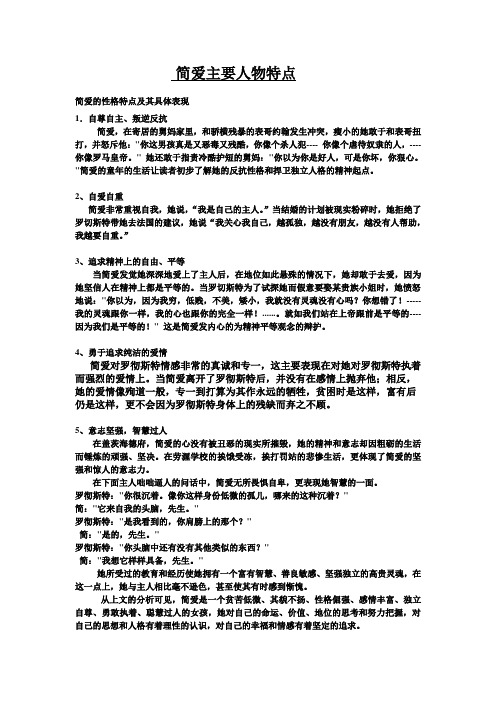
简爱主要人物特点简爱的性格特点及其具体表现1.自尊自主、叛逆反抗简爱,在寄居的舅妈家里,和骄横残暴的表哥约翰发生冲突,瘦小的她敢于和表哥扭打,并怒斥他:"你这男孩真是又恶毒又残酷,你像个杀人犯---- 你像个虐待奴隶的人,----你像罗马皇帝。
" 她还敢于指责冷酷护短的舅妈:"你以为你是好人,可是你坏,你狠心。
"简爱的童年的生活让读者初步了解她的反抗性格和捍卫独立人格的精神起点。
2、自爱自重简爱非常重视自我,她说,“我是自己的主人。
”当结婚的计划被现实粉碎时,她拒绝了罗切斯特带她去法国的建议,她说“我关心我自己,越孤独,越没有朋友,越没有人帮助,我越要自重。
”3、追求精神上的自由、平等当简爱发觉她深深地爱上了主人后,在地位如此悬殊的情况下,她却敢于去爱,因为她坚信人在精神上都是平等的。
当罗切斯特为了试探她而假意要娶某贵族小姐时,她愤怒地说:"你以为,因为我穷,低贱,不美,矮小,我就没有灵魂没有心吗?你想错了!-----我的灵魂跟你一样,我的心也跟你的完全一样!......。
就如我们站在上帝跟前是平等的----因为我们是平等的!" 这是简爱发内心的为精神平等观念的辩护。
4、勇于追求纯洁的爱情简爱对罗彻斯特情感非常的真诚和专一,这主要表现在对她对罗彻斯特执着而强烈的爱情上。
当简爱离开了罗彻斯特后,并没有在感情上抛弃他;相反,她的爱情像殉道一般,专一到打算为其作永远的牺牲,贫困时是这样,富有后仍是这样,更不会因为罗彻斯特身体上的残缺而弃之不顾。
5、意志坚强,智慧过人在盖茨海德府,简爱的心没有被丑恶的现实所摧毁,她的精神和意志却因粗砺的生活而锤炼的顽强、坚决。
在劳渥学校的挨饿受冻,挨打罚站的悲惨生活,更体现了简爱的坚强和惊人的意志力。
在下面主人咄咄逼人的问话中,简爱无所畏惧自卑,更表现她智慧的一面。
罗彻斯特:"你很沉着。
像你这样身份低微的孤儿,哪来的这种沉着?"简:"它来自我的头脑,先生。
简爱人物分析

简爱主要人物特点简爱的性格特点及其具体表现1.自尊自主、叛逆反抗简爱,在寄居的舅妈家里,和骄横残暴的表哥约翰发生冲突,瘦小的她敢于和表哥扭打,并怒斥他:"你这男孩真是又恶毒又残酷,你像个杀人犯----你像个虐待奴隶的人,----你像罗马皇帝;"她还敢于指责冷酷护短的舅妈:"你以为你是好人,可是你坏,你狠心;"简爱的童年的生活让读者初步了解她的反抗性格和扞卫独立人格的精神起点;2、自爱自重简爱非常重视自我,她说,“我是自己的主人;”当结婚的计划被现实粉碎时,她拒绝了罗切斯特带她去法国的建议,她说“我关心我自己,越孤独,越没有朋友,越没有人帮助,我越要自重;”3、追求精神上的自由、平等当简爱发觉她深深地爱上了主人后,在地位如此悬殊的情况下,她却敢于去爱,因为她坚信人在精神上都是平等的;当罗切斯特为了试探她而假意要娶某贵族小姐时,她愤怒地说:"你以为,因为我穷,低贱,不美,矮小,我就没有灵魂没有心吗你想错了-----我的灵魂跟你一样,我的心也跟你的完全一样......;就如我们站在上帝跟前是平等的----因为我们是平等的"这是简爱发内心的为精神平等观念的辩护;4、勇于追求纯洁的爱情简爱对罗彻斯特情感非常的真诚和专一,这主要表现在对她对罗彻斯特执着而强烈的爱情上;当简爱离开了罗彻斯特后,并没有在感情上抛弃他;相反,她的爱情像殉道一般,专一到打算为其作永远的牺牲,贫困时是这样,富有后仍是这样,更不会因为罗彻斯特身体上的残缺而弃之不顾;5、意志坚强,智慧过人在盖茨海德府,简爱的心没有被丑恶的现实所摧毁,她的精神和意志却因粗砺的生活而锤炼的顽强、坚决;在劳渥学校的挨饿受冻,挨打罚站的悲惨生活,更体现了简爱的坚强和惊人的意志力;在下面主人咄咄逼人的问话中,简爱无所畏惧自卑,更表现她智慧的一面;罗彻斯特:"你很沉着;像你这样身份低微的孤儿,哪来的这种沉着"简:"它来自我的头脑,先生;"罗彻斯特:"是我看到的,你肩膀上的那个"简:"是的,先生;"罗彻斯特:"你头脑中还有没有其他类似的东西"简:"我想它样样具备,先生;"她所受过的教育和经历使她拥有一个富有智慧、善良敏感、坚强独立的高贵灵魂,在这一点上,她与主人相比毫不逊色,甚至使其有时感到惭愧;从上文的分析可见,简爱是一个贫苦低微、其貌不扬、性格倔强、感情丰富、独立自尊、勇敢执着、聪慧过人的女孩,她对自己的命运、价值、地位的思考和努力把握,对自己的思想和人格有着理性的认识,对自己的幸福和情感有着坚定的追求;圣约翰圣约翰是小说中塑造的一个近乎完美的形象;他非常英俊,狂热地全身心投入自己的理想,他所有的行为都只为了一个目的,就是实现自己的理想和目标——当一名传教士,为信仰献身;他决定去印度传教,甘愿在当地恶劣的气候和野蛮愚昧的环境的双重摧残下殉教,希望以此获得永恒的拯救;伯莎;梅森伯莎从开始出现就是简爱的噩梦,她疯狂、危险、丑恶并且可怜;她是简与罗切斯特婚姻的障碍,也是简的幸福路上的障碍;她的出现,最终导致简的出走,之后她的死亡也让简回到了罗切斯特的身边;她作为配角,反衬了简爱的高尚品德,也成为美好爱情所经受的一道考验;罗切斯特他和简一样有着一颗真诚善良的心,虽然它曾经迷失,但是重新又回到了正轨;简爱正如那午夜阳光,在罗切斯特最黑暗、最需要帮助的时候出现了;她给了他一次新生,让他勇敢地面对自己,诚实坦率地说出了压抑已久的心里话;从此,他的脸上有了温柔慈祥的表情,心灵得到了充分的滋养;他深深地不顾一切地爱着简爱,这种爱,是得到理解与沟通的爱,是灵魂与灵魂之间的爱;简离开后,发生了一场大火;罗切斯特先生英勇地留在最后面走,把生的希望抢先留给了别人;这个善良的人为了拯救发疯的妻子,他不幸双目失明,身体严重残疾;这种无私的精神多么令人钦佩啊。
浅谈《简爱》中简爱性格的多面性

浅谈《简爱》中简爱性格的多面性一、本文概述《简爱》是十九世纪英国女作家夏洛蒂·勃朗特的一部脍炙人口的长篇小说。
这部小说通过主人公简·爱坎坷不平的人生经历,成功地塑造了一个不安于现状、不甘受辱、自尊自爱、自立自强、敢于抗争、敢于追求的女性形象。
简·爱的性格具有多面性,她既坚韧又温柔,既理智又感性,既独立又依赖。
这些看似矛盾的性格特点在她身上得到了完美的融合,使得她成为文学史上一个独特而深刻的人物形象。
本文旨在通过深入分析《简爱》这部小说,探讨简·爱性格的多面性,从而揭示这一形象所蕴含的深刻内涵和价值意义。
我们将从简·爱的成长背景、爱情观、人生观等方面入手,全面解读她的性格特征,以期能够更深入地理解这一经典人物形象,并从中汲取启示和力量。
二、简爱的独立与自主在《简爱》这部作品中,简爱的独立与自主性格被表现得淋漓尽致。
她虽然身世悲惨,从小就失去了父母,被迫寄养在舅母家,忍受着舅母的虐待和表哥的欺侮,但她从未放弃过自己的尊严和独立。
当舅母将她送到洛伍德学校时,她并没有因此而屈服,反而以坚韧的毅力度过了那段艰难的日子。
在洛伍德学校,简爱经历了贫困、饥饿和疾病的洗礼,但她从未向命运低头。
她努力学习,不断提高自己,用知识和智慧武装自己。
这种独立和自主的精神,使得她在面对生活中的种种困境时,都能够保持冷静和理智,以积极的态度去面对和解决问题。
简爱的独立与自主还体现在她与罗切斯特的爱情关系上。
在面对罗切斯特的求婚时,她并没有因为自己的地位和金钱的差距而自卑或退缩,而是勇敢地表达了自己的真实感受。
她拒绝了罗切斯特的求婚,因为她认为爱情应该是建立在平等和尊重的基础上的。
这种独立和自主的精神,使得她在面对爱情时,能够坚守自己的原则和价值观,不被外界所左右。
简爱的独立与自主还体现在她对生活的态度上。
她不愿意过一种依附于别人的生活,而是希望通过自己的努力来实现自己的价值。
她勇敢地离开了罗切斯特,开始了自己的新生活。
从夏洛蒂·勃朗特看简爱的双重性格
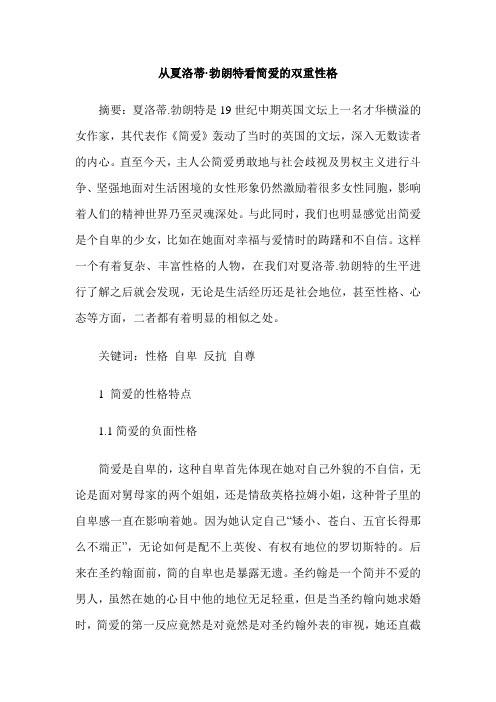
从夏洛蒂·勃朗特看简爱的双重性格摘要:夏洛蒂.勃朗特是19世纪中期英国文坛上一名才华横溢的女作家,其代表作《简爱》轰动了当时的英国的文坛,深入无数读者的内心。
直至今天,主人公简爱勇敢地与社会歧视及男权主义进行斗争、坚强地面对生活困境的女性形象仍然激励着很多女性同胞,影响着人们的精神世界乃至灵魂深处。
与此同时,我们也明显感觉出简爱是个自卑的少女,比如在她面对幸福与爱情时的踌躇和不自信。
这样一个有着复杂、丰富性格的人物,在我们对夏洛蒂.勃朗特的生平进行了解之后就会发现,无论是生活经历还是社会地位,甚至性格、心态等方面,二者都有着明显的相似之处。
关键词:性格自卑反抗自尊1 简爱的性格特点1.1简爱的负面性格简爱是自卑的,这种自卑首先体现在她对自己外貌的不自信,无论是面对舅母家的两个姐姐,还是情敌英格拉姆小姐,这种骨子里的自卑感一直在影响着她。
因为她认定自己“矮小、苍白、五官长得那么不端正”,无论如何是配不上英俊、有权有地位的罗切斯特的。
后来在圣约翰面前,简的自卑也是暴露无遗。
圣约翰是一个简并不爱的男人,虽然在她的心目中他的地位无足轻重,但是当圣约翰向她求婚时,简爱的第一反应竟然是对竟然是对圣约翰外表的审视,她还直截了当地对圣约翰的妹妹说:“他是个漂亮人……而我……是这样不漂亮做他的妻子,哦,永远不可能!” 当然,这种自卑心理,除了自身原因外,还有深刻的社会根源。
19世纪的英国社会,以貌取人是当时普遍流行的审美标准,特别是在社交场合中更是用来炫耀、吸引别人的资本。
生活在这种社会大环境下,不可能不受到这种庸俗审美观的影响。
简爱的自卑感还来源于她对自己门第出身的认识。
她的童年是不幸的,她是一个贫穷牧师的女儿出生不久她的父母就死了,舅舅在临死前把她托付给舅妈抚养,住在盖茨海德府。
然而,在这里,狠心的舅妈和刁蛮的表兄妹,甚至家里的仆人,都对她冷眼相向,欺辱、虐待,尽管她小心谨慎,不敢犯一点错。
“不公平!”这是简爱被舅妈囚禁在空房间里,想到自己所受到的虐待,发自内心的呐喊。
简爱性格特点及对应情节
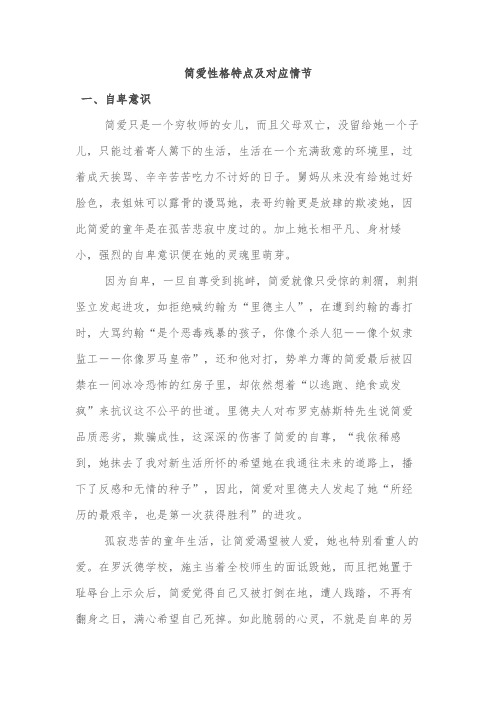
简爱性格特点及对应情节一、自卑意识简爱只是一个穷牧师的女儿,而且父母双亡,没留给她一个子儿,只能过着寄人篱下的生活,生活在一个充满敌意的环境里,过着成天挨骂、辛辛苦苦吃力不讨好的日子。
舅妈从来没有给她过好脸色,表姐妹可以露骨的谩骂她,表哥约翰更是放肆的欺凌她,因此简爱的童年是在孤苦悲寂中度过的。
加上她长相平凡、身材矮小,强烈的自卑意识便在她的灵魂里萌芽。
因为自卑,一旦自尊受到挑衅,简爱就像只受惊的刺猬,刺荆竖立发起进攻,如拒绝喊约翰为“里德主人”,在遭到约翰的毒打时,大骂约翰“是个恶毒残暴的孩子,你像个杀人犯――像个奴隶监工――你像罗马皇帝”,还和他对打,势单力薄的简爱最后被囚禁在一间冰冷恐怖的红房子里,却依然想着“以逃跑、绝食或发疯”来抗议这不公平的世道。
里德夫人对布罗克赫斯特先生说简爱品质恶劣,欺骗成性,这深深的伤害了简爱的自尊,“我依稀感到,她抹去了我对新生活所怀的希望她在我通往未来的道路上,播下了反感和无情的种子”,因此,简爱对里德夫人发起了她“所经历的最艰辛,也是第一次获得胜利”的进攻。
孤寂悲苦的童年生活,让简爱渴望被人爱,她也特别看重人的爱。
在罗沃德学校,施主当着全校师生的面诋毁她,而且把她置于耻辱台上示众后,简爱觉得自己又被打倒在地,遭人践踏,不再有翻身之日,满心希望自己死掉。
如此脆弱的心灵,不就是自卑的另一种表现吗?因为自卑,简爱渴望平等。
“是我的灵魂同你的灵魂在对话,就好象我们两个人穿过坟墓,站在上帝脚下,彼此平等――本来就如此!”简爱追求平等,可是自卑的心理让她无法坦然面对财产和地位的差距。
简爱敢于追求自己的幸福,但自卑意识仍然影响到她对婚姻的态度。
“要是上帝赐予我一点姿色和充足的财富,我会使你同我现在一样难分难舍”在谈及结婚饰品时,简爱拒绝钻石珠宝,在米尔科特给她买衣服时,简爱显得不安,“他给我买的东西越多,我的脸为恼恨和堕落感而更加烧灼得厉害了如果我有那么一点儿独立财产的话说实在的,我会心安理得的”当罗切斯特问她还需要什么时,她立刻回答:“你的尊重。
伦理学视角下简爱多重性格分析
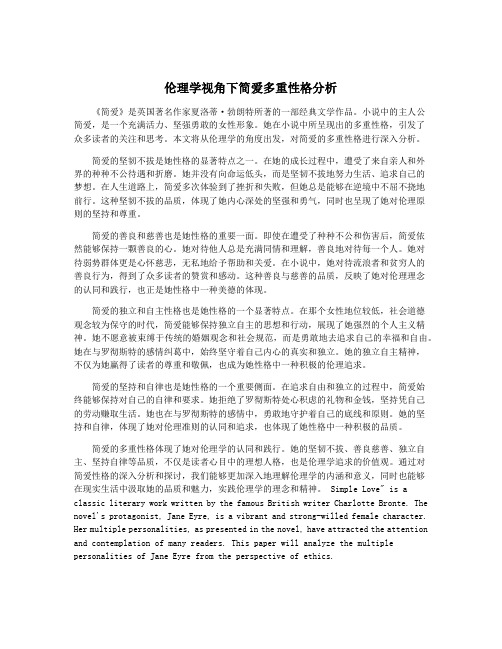
伦理学视角下简爱多重性格分析《简爱》是英国著名作家夏洛蒂·勃朗特所著的一部经典文学作品。
小说中的主人公简爱,是一个充满活力、坚强勇敢的女性形象。
她在小说中所呈现出的多重性格,引发了众多读者的关注和思考。
本文将从伦理学的角度出发,对简爱的多重性格进行深入分析。
简爱的坚韧不拔是她性格的显著特点之一。
在她的成长过程中,遭受了来自亲人和外界的种种不公待遇和折磨。
她并没有向命运低头,而是坚韧不拔地努力生活、追求自己的梦想。
在人生道路上,简爱多次体验到了挫折和失败,但她总是能够在逆境中不屈不挠地前行。
这种坚韧不拔的品质,体现了她内心深处的坚强和勇气,同时也呈现了她对伦理原则的坚持和尊重。
简爱的善良和慈善也是她性格的重要一面。
即使在遭受了种种不公和伤害后,简爱依然能够保持一颗善良的心。
她对待他人总是充满同情和理解,善良地对待每一个人。
她对待弱势群体更是心怀慈悲,无私地给予帮助和关爱。
在小说中,她对待流浪者和贫穷人的善良行为,得到了众多读者的赞赏和感动。
这种善良与慈善的品质,反映了她对伦理理念的认同和践行,也正是她性格中一种美德的体现。
简爱的独立和自主性格也是她性格的一个显著特点。
在那个女性地位较低,社会道德观念较为保守的时代,简爱能够保持独立自主的思想和行动,展现了她强烈的个人主义精神。
她不愿意被束缚于传统的婚姻观念和社会规范,而是勇敢地去追求自己的幸福和自由。
她在与罗彻斯特的感情纠葛中,始终坚守着自己内心的真实和独立。
她的独立自主精神,不仅为她赢得了读者的尊重和敬佩,也成为她性格中一种积极的伦理追求。
简爱的坚持和自律也是她性格的一个重要侧面。
在追求自由和独立的过程中,简爱始终能够保持对自己的自律和要求。
她拒绝了罗彻斯特处心积虑的礼物和金钱,坚持凭自己的劳动赚取生活。
她也在与罗彻斯特的感情中,勇敢地守护着自己的底线和原则。
她的坚持和自律,体现了她对伦理准则的认同和追求,也体现了她性格中一种积极的品质。
简爱性格特征
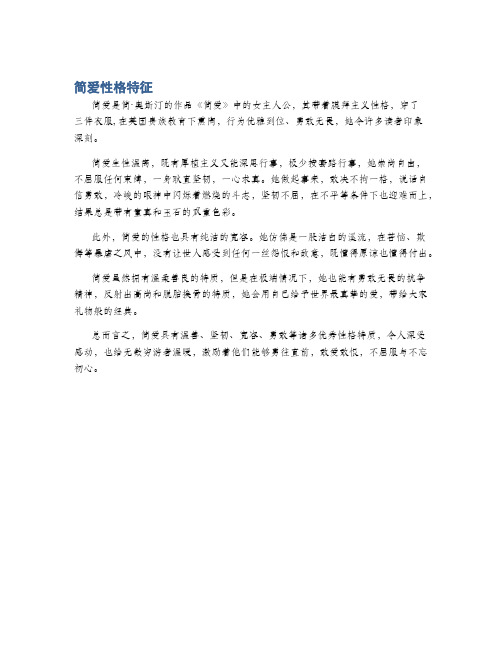
简爱性格特征
简爱是简·奥斯汀的作品《简爱》中的女主人公,其带着膜拜主义性格,穿了
三件衣服, 在英国贵族教育下熏陶,行为优雅到位、勇敢无畏,她令许多读者印象
深刻。
简爱生性温离,既有厚植主义又能深思行事,极少按套路行事,她崇尚自由,不屈服任何束缚,一身耿直坚韧,一心求真。
她做起事来,敢决不拘一格,说话自信勇敢,冷峻的眼神中闪烁着燃烧的斗志,坚韧不屈,在不平等条件下也迎难而上,结果总是带有童真和玉石的双重色彩。
此外,简爱的性格也具有纯洁的宽容。
她仿佛是一股洁白的溪流,在苦恼、欺侮等暴虐之风中,没有让世人感受到任何一丝怨恨和敌意,既懂得原谅也懂得付出。
简爱虽然拥有温柔善良的特质,但是在极端情况下,她也能有勇敢无畏的抗争精神,反射出高尚和脱胎换骨的特质,她会用自己给予世界最真挚的爱,带给大家礼物般的经典。
总而言之,简爱具有温善、坚韧、宽容、勇敢等诸多优秀性格特质,令人深受感动,也给无数穷游者温暖,激励着他们能够勇往直前,敢爱敢恨,不屈服与不忘初心。
浅析简爱的性格冲突

浅析简爱的性格冲突浅析简爱的性格冲突自《简爱》面世以来,论及时,评论者的眼光通常落在简爱的反抗上,把她视为叛逆者的典范,并试图赋予她崇高的意义。
她的粗鲁任性,她的其貌不扬,她的桀骜不驯,她的坚定执着,她的性格中的种种优点与缺点,都能引发人们巨大的兴趣和讨论的热情。
一、自尊与自卑的同行并立毫无疑问,简爱是自尊的,她甚至将自我的尊严视为高于爱情和生命的一切。
为了神圣不可玷污的尊严,即将走向婚姻的简爱毅然决然地放弃了唾手可得的爱情,在爱人苦苦的挽留声中重新开始了浪迹天涯的生活。
简爱同时是自卑的,我们不难发现,简爱的自卑出于三个方面的原因:对自身容貌的不满,对自身地位的不满和对自身财产的不满。
在作品中,作者为简爱安排了一个动人的情节:在桑菲尔德,炽热喷涌的情感撞击使简.爱与罗切斯特深深品味了爱情美酒的甜蜜。
罗切斯特迫不及待地要使他的爱人一次次欣喜,把全部他认为有价值的东西供奉给简爱。
当罗切斯特许诺给她家传的珍宝和一半田产时,却遭到了简爱的毅然拒绝:"我要你的一半田产有什么用呢?你以为我是个放高利贷的犹太人,想在田产上找个好的投资吗?我宁可要你完全跟我推心置腹。
"俨然一个视金钱为粪土的杜十娘。
的确,这番高尚的爱情宣言不仅打动了罗切斯特,也打动了读者。
然而,我们要清楚的是,杜十娘之所以鄙视财富是因为她有一个装满金银珠宝的百宝箱,而简爱只是一个不名一文的穷教师。
事实上,简爱拒绝罗切斯特的慷慨馈赠,不单是至高无上的爱情在做主,更是因为罗切斯特的行为触动了她内心深处那根敏感的神经--男女双方财富的巨大鸿沟使她无法慨然接受爱人的给予,罗切斯特的慷慨对简爱来说是一种施舍,而这无疑刺激了她内心深处的自卑感,并使之转化成一种极端的自尊行为。
二、"天使"与"魔鬼"的平衡一直以来,西方国家受基督教的影响甚深,人们思想里有一种传统的观念:女人是男人身上的一根肋骨;也就是说女人从属于男人。
从自卑到自信——解析简爱性格的两个极端

Vo l.32No .3Mar.2011第32卷第3期2011年3月赤峰学院学报(汉文哲学社会科学版)J o urnal of C hifeng University (S o c.S ci )《简爱》是英国19世纪现实主义女作家夏洛蒂·勃朗特的一部传世经典名著。
她从三个阶段对简爱的成长进行描述。
寄居在舅母家的简爱自幼父母双亡,受尽凌辱的小简爱当时并没有失掉她的人格和尊严,反而在幼时恶劣的生存环境中学会了如何生存,如何去用自己的努力去挑战当时不公平的社会。
也正是她的成长经历,造就了她独立的人格、进取的精神和美好的理想,她只靠自己生活,敢于表达自己的思想。
在世俗的压力下,她凭借努力工作,聪明的智慧和倔强的个性,始终保持着自己的尊严,在她生活的道路上,从不屈服命运,勇敢追求真爱并对所爱的人忠贞不渝。
面对贫困低下的社会地位,或是她那漂泊无依的生活遭遇,简爱就像是一只正在蜕变的蝴蝶,经过一番艰苦的磨练终于破茧成蝶。
在简爱的性格中,自尊占据着重要的地位,她的自尊来源于自卑,正是自卑促使着简爱的自强,去挑战不公平的社会,也是由于自强使简爱找到了自信,实现了自己性格的最终统一,收获了幸福的生活和完美的爱情。
一、简爱自卑心理形成的原因“不公平啊!不公平!”这是简爱在舅母家被囚禁在空房中时,想到自己所受到的虐待,从内心发出的呐喊。
女主人公简爱出生于一个穷牧师家庭,她没有美丽的面容和婀娜的身姿,她“贫穷、低微、不美、矮小”,与以往爱情故事中的女主人公美丽温柔、高贵贤淑的形象形成鲜明对比,但和其它作品中的主人公一样,简爱的命运深深地吸引着我们。
命运把简爱抛掷到一个父母双亡、寄人篱下的生存环境。
姨妈的嫌弃,表姐的蔑视,表兄的辱骂和毒打,以及势利的佣人们的为虎作伥,这一切都没有使她屈服。
相反,她以弱小的身躯做出了强烈的反抗。
简爱并不像其它小说中的主人公因为自己是一个孤儿就自暴自弃从此沉沦,恰恰相反,正是这种艰苦的生活,造就了她倔强的性格和勇于追求平等幸福的精神。
对《简爱》中人物简爱性格的分析

An Analysis of Jane Eyre’s Personality in Jane Eyre 对《简·爱》中人物简爱性格的分析摘要《简爱》是英国著名的作家夏洛蒂·勃朗特根据她的自身经历写的一部小说,也是她的成名作。
它在英国文学史上占有重要地位。
小说所写的是一位坚强独立的女性,她追求真爱,平等,是女性的楷模。
作者在其作品中成功的塑造了英国文学史中第一个对爱情,生活,社会以及宗教采取了独立自主积极进取态度和敢于斗争,敢于争取自由平等的女性形象—简·爱。
简·爱鲜明的性格特征给广大读者留下了深刻的印象。
这篇论文主要结合简·爱的生活经历,分析她正面和负面的双重性格特征,使人们更深地了解《简爱》及其现实意义。
旨在给生活在现代女性提出建议,即使现在女性地位有所改善,但由于保守的习俗根深蒂固,女性应该更勇敢,更锲而不舍的反抗那些不合理习俗。
关键词:夏洛蒂·勃朗特;简·爱;双重性格安阳师范学院人文管理学院本科毕业论文AbstractJane Eyre was written in 1846 by the famous British writer Charlotte Bronte, which was based on her own experiences. It is also her masterpiece. The novel enjoys a high appraisal in English literature. The novel depicts an independent and tough woman who pursues equality and true love. The author successfully portrayed a great female image—Jane Eyre. The bright characters of the heroine give readers a deep impression.This paper gives an analytical study of dual characters of Jane Eyre, so as to help people understand Jane Eyre deeper and comprehend its realistic significance more. The author of this thesis aims to gives advice to modern women, although women’s status is improved now, the conservative conventions is deep and ingrained root. Women should have the courage to fight against the conservative conventions.Key Words: Charlotte Bronte; Jane Eyre; dual CharactersContents摘要 (I)Abstract (II)1. Introduction (1)1.1 Introduction to Charlotte Bronte (1)1.2 Introduction to Jane Eyre (1)2. An Analysis of the Personality of Jane Eyre (2)2.1 Jane Eyre’s Positive Personality (3)2.1.1 Jane Eyre’s Independence (3)2.1.2 Jane Eyre’s Pursuit of Equali ty (4)2.1.3 Jane Eyre’s Pursuit of Liberty (4)2.1.4 Her Pursuit of True Love (5)2.2 Jane Eyre’s Negative Personality (6)2.2.1 Jane Eyre’s Self-abasement (6)2.2.2 Jane Eyre’s Worship of Traditional Marriage (7)3. Causes of Jane Eyre’s Personality (8)3.1 Causes of Jane Eyre’s Positive Personality (8)3.1.1 Influence of Jane Eyre’s Sufferings (8)3.1.2 Influence of Social Background in Victorian Age (8)3.2 Causes of Jane Eyre’s Negative Personality (8)3.2.1 Influence of Jane Eyre’s Plain Appearance (9)3.2.2 Influence of Charlotte Bronte (9)4. Conclusion (10)Bibliography (11)Acknowledgments (12)1.Introduction1.1 Introduction to Charlotte BronteCharlotte Bronte (April 21, 1816~March 31, 1855) is an English writer, she is famous for her novel Jane Eyre. Jane Eyre is written in 1847, Charlotte Bronte is sister of Anne Bronte and Emily Bronte. The three sisters are as famous for their tragic, short lives as for their novels. In the past 40 years Charlotte Bronte’s reputation has risen rapidly, and feminist criticism has done much to show that she was speaking up for oppressed women of every age. Another typical work of Charlotte is Shirley, Shirley described the workers’ movement in 19 century. Charlotte was born in the north of England, she is the daughter of an Anglican clergyman. The Anglican clergyman moved with his family to Haworth amid the Yorkshire moors in 1820. After their mother and two eldest children died, Charlotte was left with her sisters Emily and Anne and brother Branwell to take care of their father, their religious, strict aunt. Charlotte attended the Clergy Daughter’s Sc hool at Cowan Bridge in 1824. Because of the harsh conditions, she returned home next year. In 1831, She went to school at Roe Head, at there Charlotte Bronte worked as a teacher. However, she fell bad, suffered from melancholia, and gave up this post. Cha rlotte’s attempts to earn her living as a governess.The collection of poems, Poems by Currer, Ellis And Acton Bell(1846), which Charlotte Bronte wrote with her sisters, sold only two copies. By this time she had finished a novel, The Professor, but during her lifetime, it never found a publisher. Undeterred by this rejection, Charlotte began Jane Eyre, which appeared in 1847, Jane Eyre became an immediate success. Her works are all about some lonely and neglected young woman with a fierce longing for love, understanding and a full, happy life.1.2 Introduction to Jane EyreJane Eyre has high appraisal in literature history. It is the typical work of Charlotte Bronte. This work narrates Jane Eyre’s life experiences.Jane Eyre is an orphan, when she was very little, she is ill-treated. But at last, she became anindependent woman. When she was born, she is unlucky. She was sent to her uncle’s family because she lost her parents. In the family, she was ill-treated. She is timid, little, ugly and is a “little thing”. She has no clear identity. The power presses her, strangles her personality. Although the reality is cruel, Jane Eyre is not destroyed by it. And, she learns how to live, she becomes strong. She struggles against the pressure in life and the cruel, she take her courage to struggle with the reality. She shows a completely new woman image. She is very brave, independent, calm and ration.This paper also presents Jane Eyre’s viewpoint about love. Jane Eyre is very poor, she has nothing but the power of individual spirit. She thinks love must be based on equality. Love needs equality. Jane Eyre denies the inequality of marriage. Jane Eyre pursues equality on social status, economy and personality. She believes in equality between men and women.2. A Detailed Analysis of the Personality of Jane EyreThe Industrial Revolution opened up a new world for lower-class women, offering them new factory jobs. But it did not do much good for the middle class. A single woman at this economic level still could not have a good job, there are only one job for these woman: governess. Jane Eyre is pretty attractive. Jane Eyre is a kind girl with soft heart who always brings love to people around her, she helps Helen Burns and Mr. Rochester when they are in trouble. Her self-respect is related to her life environment. She is plain but aspiring, her figure is small but her soul is huge. In Jane Eyre’s opinion, everyone is the same at God’s feet. Though there are differences in property, appearance and also status, all the human beings are equal in personality. Jane Eyre is exposed to a bad environment but continuously and fearlessly struggling for her ideal life. Jane shows her determination in pursuing her self-esteem and independence at every stage of her life, both in struggling with social pressure and resisting the temptation of passion and love. And Jane is a straight person, she never flatters others, for example, she hates her aunt, so she told her the truth and when Mr. Rochester asked her if he is handsome, she answered “no”without any hesitation.Jane is tolerant, although her aunt hurt her deeply, she can forgive her aunt. She has sense and morality, when she knows Mr. Rochester was a married man, she leaves Mr. Rochester resolutely. Jane is strong and brave, she is very kind. Her idea of equality and self-respect impress us so much and let us feel the power inside her body. Under the pressure of life, Jane Eyre is hard-working. She is wisdom. Although Jane Eyre has little figure, she never gives in on her way. She is very loyal to her true love. She is the master of her own life. She deserves to be loved.Jane Eyre has the character of female consciousness. She is a small, plain-faced orphan-girl, but she is smart, independent and passionate. In the novel, Jane Eyre’s bright characters give readers a deep impression.On the one hand, Jane Eyre is calm and independent. On the other hand, she is self-abased and conventional.2.1 Jane Eyre’s Positive PersonalityJane is independent and brave. After she knows she has fallen in love with her host, whose condition differs from hers deeply, she thinks that people are equal spiritually. Her courage to love a rich gentleman is like a beggar hopes to be the king.2.1.1 Jane Eyre’s IndependenceBeing an orphan, she is poor and lonely in the world. She seems doomed to have a life of failure. Her aunt Reed and her cousins treat her cruelly as an alienation. They deepen her determination of rebellion. She realizes that she will never find a true sense of home, she will never find a true sense of community, she feels the need of belonging, to find “skin,” or at least “kindred spirits.”The “red-room” life deepens her courage in resisting her aunt’s unfair punishment, which foreshadows Jane’s independence or rebelliousness. The experience at Gatehead makes her realize that she needs equality and freedom. The unfortunate experience at Gatehead makes her realize it is not necessary to fear authority. As an orphan, she was sent into Gateshead Hall of her uncle Mr. Reed. However, after Mr. Reed’s death, her aunt, Mrs. Reed treats her cruelly. Jane suffers lots of abuse, her cousins also found pleasure in teasing and mocking her. Though living under this circumstance, Jane did not surrender. After a series of sharp conflicts with the families, Jane was sent to Lowood school, a school for orphans. Jane studied as a student for 8 years and worked as a teacher for 2 yearsthere. Later, she accepted a governess position at a manor called Thornfield, where she taught a lively French girl. She rarely gained love and warmth from the family and lived her childhood unhappily. In a word, Jane Eyre starts her life without parents, money and good family environment.2.1.2 Jane Eyre’s Pursuit of EqualityJane Eyre insists on pursuing equality throughout her whole life. She struggles to overcome oppression and achieve equality. Because of the class hierarchy, she has to fight against those who believe women are inferior to men. There are three people who threaten her, Mr. Brocklehurst, Edward Rochester, and St John Rivers, who want to keep Jane Eyre in a submissive position, make her unable to express her thoughts and feelings. In her quest for independence, she has to escape Brocklehurst, reject St John and comes to Rochester after ensuring that they may marry as equals. She spends at Moor House during this time. She doesn’t depend on Rochester for love, she can be financially independent. Finally, Rochester is bind, Jane becomes his wife. Women are supposed to be ordinary, they need to stay at home. If they want to do more or learn more than custom has pronounced necessary for their sex, they are not allowed. After a long time, Jane becomes a maternal, independent, sensitive and artistic young women. Jane refused to marry to Rochester because she understands she must forfeit her independence in the unions and marry Rochester when she has attained financial independence to maintain a marriage of equality.2.1.3 Jane Eyre’s Pursuit of LibertyIn order to lead a life of independence, Jane Eyre worked at Thornfield Hall. She was looked down upon by the rich ladies of the society, but Jane never despised herself. She was proud of her work. Rochester was attracted to her qualify, strong personality, courage, and independence, he even fell in love with her. But Jane makes it clear to him, “Do you think, because I am poor, obscure, plain, and little, I am soulless and heartless?” she cries, “You think wrong. I have as much soul as you—and full as much heart! And if god had gifted me with some beauty, and much wealth, I should have made it as hard for you to leave me, as it is now for me to leave you. I am not talking to you through the medium of custom, conversation, nor even ofmortal flesh—it is my spirit that addresses your spirit ;just as if both had passed through the grave, and we stood at god’s feet—equal,--as we are!” (Charlotte Bronte, 2006:9). Equality is what she strives for, and in him she strives for. Without Rochester, her material life can’t be affected, but she can not part from Rochester in spirit and emotion. Jane loves Rochester, she feels they are kind by nature, Rochester is the first person to offer Jane lasting love. Rochester offers Jane a real home. Rochester is superior to Jane socially and economically. In Victorian period, men were considered to be naturally superior to women. Jane decides to leave Rochester after she knew Rochester has a mad wife, she doesn’t want to be his mistress, she doesn’t want to lose her dignity.In Victorian era women was arranged by wealth and class. Jane’s independence could have been considered a huge accomplishment. If Jane had stayed at Lowood, she could have never met Rochester. In a Marxist point of view Jane’s separation from her social structure, marked by her unique boldness, helps her succeed over the average woman in Victorian era. If Jane had stayed at Lowood, she would have never met her emotional success. She is searching for the strong bonds in family. Jane naturally could not be confined to a dull place. In a Marxist point of view, the average woman would be content with her position in life. She had food and a roof over her head. Before this, she had nothing. Jane’s idea of success led her to Rochester and the love she never had. Jane’s unique traits of boldness, courage, strong will all help her succeed in her time. But Charlotte Bronte wants to express the restrictions upon women during that time. By expressing these hardships she writes a work and defines the hardship of her social structure due to the economic base of its time. Although Victorian era has long since passed, Jane Eyre’s character traits have not. In each person, we can find strong will, courage, and boldness. Though her story, her traits still live on, and still lead to success.2.1.4 Her Pursuit of True LoveLove is the most beautiful thing in the world. There is no difference in front of true love. True love should not be measured by social status, fortune, age, rights. Most people like to pursue very romantic love. But I think, it is very important for a manand woman to have the same aim and find a perfect response. Shakespeare said, “The course of true love never did run smooth.” (Shakespeare,1996:31) Jane and Rochester find true love after a lot of sufferings.When Jane finds her falls in love with Mr. Rochester, who has wisdom and rich experience, she is not afraid. Jane Eyre and Mr. Rochester have large social status disparity, but Jane dares to love Mr. Rochester. She believes everyone is equal. Mr. Rochester does not know whether Jane loves him, so he pretends to marry a rich woman. And the woman is very noble. When Jane hears this news, she is very angry. She pursues equality, not wealth; She pursues the equal combination of two hearts, not position. After she knows Mr. Rochester has a wife, she leaves Thornfield, but she finally goes back to Thornfield. At that time. Mr. Rochester has bad health and becomes blind, she still loves to accompany him.2.2 Jane Eyre’s Negative PersonalityOn the one hand, Jane Eyre is calm, rational, and independent. On the other hand, she is self-abased and conventional.2.2.1 Jane Eyre’s Self-abasementSelf-abasement is a normal psychology for every person. To some extent, it can make us have a clear judgment on ourselves. Self-abasement is not frightening. The vital thing is how we defeat it and walk out of its shadow. But Jane Eyre can not go out of this shadow, it surpasses the normal degree, it becomes a fixed factor in her character. It always perplexes her.Jane Eyre feels she is not good-looking, she feels tiny and low about her out-looking. It shows that she is self-contemptuous. In Thornfield, When Rochester shows her his love she shows self-contemptuous again. What makes her suspect Rochester’s love is her self-abased mood. When she faces Miss Ingram, Jane is hesitant. Miss Ingram is beautiful and wealthy. Jane Eyre compares herself with Miss Ingram, then makes a conclusion “He can not love me forever”. Jane is not brave enough, she pursues the equality. After Jane and Rochester fall in love with each other and get ready to got married, she unfortunately come to know that Rochester had got a legal wife, she seems to be the shadow following Rochester, and it leads toRochester’s moodiness all the time. At that time, the wedding is canceled. Rochester wants Jane to accompany him to the south of France, at France they would live as husband and wife, though they could not be married. Although Jane still loves Rochester, she refuses. She refuses to betray the God-given morals and principles she has always believed in—“I care for myself. Not having a friend more as being lonelier, the more wanting self-respect, as not having person help, our more” (Charlotte Bronte, 2006:11). Most of us think the sentences express Jane as the master of herself, and she is very independent. But I think, the action shows her inactive attitude towards her love. For the future, she is not confident. She loves Rochester but she is not brave enough. She is not brave to express her love, the love is not strong enough to let her fight against convention and secular vision. So, she chooses to flee from there.Knowing Rochester’s misfortune, Jane decides to stay with him forever. But Jane still chooses to leave when Rochester needed her most. So, we can see, Jane is not brave to fight for her love. She compromises to the traditional concept of marriage. Jane’s love is controlled by other things and other people.2.2.2 Jane Eyre’s Worship of Traditional MarriageJane resists to put her marriage on the religious. She can’t give up her deep love to Rochester, she can’t stand a marriage without love. Her love for Mr. Rochester has nothing to do with appearance, prosperity, social status and other such things, just for love. Her love needs courage to break traditional concepts. She dares to speak out her love for Mr. Rochester but gives up the love for personal quality.But Jane Eyre yields to traditional marriage which lets us feel disappointed. Jane thinks Bertha Mason represents the will of law. What she needs to do is to give up. She has no chance to strive for love. Because of her worship of traditional marriage, she has no courage to pursue her love. She decides to leave Rochester. At the end, she becomes the loyal defender of traditional marriage.3. Causes of Jane Eyre’s Personality3.1 Causes of Jane Eyre’s Positive PersonalityJane has a plain character, she is attractive. She is a kind girl with soft heart. She pursues equality and the equal combination of two hearts. She is poor but aspiring, small in figure but huge in soul.3.1.1 Influence of Jane Eyre’s SufferingsJane Eyre is an orphan, since early childhood, she feels deserted, exiled. The cruel treatment she receives from her cousins and her Aunt Reed makes her feel lonely. Being worried about not going to find a true sense of home, Jane feels the necessity of finding a home. Then, Jane is sent away to Lowood School, at there she wants to enrich herself with knowledge and learns practical skills for women in that age. In order to cover her shortage, Jane smartly endeavors to gain more aesthetic female accomplishment, which includes speaking French, playing the piano. In the end, Jane is almost versatile.3.1.2 Influence of Social Background in Victorian AgeIn Britain, Victorian time is a great era. Victorian spirit is still influencing Britain until now. The former British prime Minister, Margaret Thatcher has ever said that Victorian value is the value of British prosperous age. Because the prosperity of the society, the release of productive forces, those middle class has leisure time, so they can arrange their time. People are influenced by the leading ideological trend of utilitarianism, seeking the spirit of universal fraternity and democracy.In Britain, at that time, the only occupation for women was teaching as school mistresses or serving as governesses in private families. In Victorian time, the moral code for women was that they should remain ignorant. So, in the novel, young girls, who went out alone in the world and suffered various trials, temptation and miseries, had been popular in England for over a century. Charlotte Bronte and Jane Eyre challenged the traditional discrimination to women.3.2 Causes of Jane Eyre’s Negative PersonalityJane Eyre’s plain appearance and the author’s personal experience lead to JaneEyre’s negative Characters.3.2.1 Influence of Jane Eyre’s Plain AppearanceAppearance is very important for woman. When people evaluate a woman, appearance is very important. Jane Eyre is weak and short. In childhood, Jane Eyre is deeply self-abased for her appearance. When she sees her beautiful cousins, she thinks “I know that had I been a sanguine, brilliant, careless, exacting, handsome, romping, child-though equally dependent and friendless-Mrs.Reed would have endured my presence more complacently; her children would have entertained for me more of the cordiality of fellow-feeling; the servants would have been less prone to make me the scapegoat of the nursery.”(Charlotte Bronte, 2006:44) She thinks the reason why people do not like her is because her appearance. It makes her feel more self-abased. When Mrs.Read punishes her, she thinks it is very natural. She thinks Ingram is very beautiful. She feels self-abasement. She thinks she cannot complete with Ingram. She hides herself.3.2.2 Influence of Charlotte BronteJane Eyre has lots of similarities with Charlotte Bronte. Her experiences are the mirror of Charlotte Bronte. They have similar family background, similar boarding school experiences, similar feminism, similar vision of love and similar appearance. They are both normal, Jane is an orphan, Charlotte Bronte’s mother died when she was very young. They both live their life by working as a governess. In a word, Jane Eyre reflects Charlotte Bronte in many ways. She is eager to have a warm family even though she had experienced so many difficulties before that. She puts her experiences to Jane’s growth to make her strong and tough, letting her overcome hardship before she got her happiness. Jane Eyre’s life was Charlotte’s ideal life. Though there are a lot of sufferings, there are still a happy ending waiting for her, which is the reward of her determination.4. ConclusionJane Eyre is the famous work of Charlotte Bronte. Jane is such a great woman, for she dares to challenge people’s traditional opinions. Her so many beautiful personalities make her a charming woman. From a weak small orphan girl in lower class. Jane Eyre ultimately gains a happy life. It is seldom is British society as that time, especially she owns nothing, has a plain appearance. The success she has gained wholly decided by her hardworking and lasting pursuit.In Jane’s path of life, Jane dares to rebel and struggle for equality, freedom and happiness. When Jane knows Rochester has already got married, she is able to control herself better than many men who would n ever be able to. Jane does not want to be Rochester’s mistress. Although Jane gets heavy hit, but she leaves resolutely, poor, lonely and homeless. She thinks she can live by herself. She is not only realistic but also ideal, self-confident but shy before strangers. Charlotte Bronte gives Jane a character that full of contrasts, and Jane Eyre really has a complex character. She learns how to live because of her childhood’s environment. And Jane Eyre’s growing experience makes her wise and smart. She thinks self-respect is necessary. Jane Eyre denies the inequality of marriage. She pursues the equality between man and women. Though social condition influenced her, she has some negative characters—too devout, self-contemptuous. She is still a great woman. Although Jane Eyre is a girl with little figure, she is strong inside. She never gives in to pursue her true love.Bibliography[1] 廖素清.An Analysis of Jane Eyre’s Personality of Independence[J].牡丹江教育学院学报,2007年第3期.27-31.[2] Zhu Qingying. Jane Eyre[M]. YiWei Press, 1989. 37-49[3] 赵丽君.The Character in British Fiction: A Critical History[M].上海外语教育出版社, 2008.[4] Charlotte, Bronte, Jane Eyre, 上海:上海世纪图书出版公司, 2003, 16—39[5] Liu Jiangyan, “An Analysis of the Development of Jane Eyre’s Characters”[J],《西江大学学报》1997,(1):51—57.[6] Yang Xiaojing. “Jane Eyre: Contradictions in Women”[J],《安徽文学》, 20(4):18—19.[7] 刘丽. 谈《简·爱》中的典型人物简爱[J] 辽宁高职学报, 1999,(1):2-3.[8] 陈小兆, 萧好章. 从“失乐园”到“复乐园”——《简爱》故事情节的“圣经”原型意象[J]. 井冈山师范学院学报[J], 2002,(4): 1-3.[9] 毛竹生. 简爱的出走与自我实现[J]. 济南教育学院学报, 2001,(6): 5-6.[10] 毛竹生. 简爱的成长之路及其心理机制[J]. 邯郸师专学报, 2001,(2):2-3[11] 梁晨. 宿命的选择——对《简爱》中爱与女性独立意识的重读[J].安徽文学(下半月),2011,(5): 21-40.[12] 赵竹轩.《简爱》的叙述语言与主人公的个性发展[J].,2011,(8): 32-43.[13] 夏洛蒂·勃朗特著,祝庆英译. 《简爱》[M].上海:上海译文出版社,1980235-394.AcknowledgmentsFirst of all, I would like to express my thanks to all those people who helped me during the writing of this paper. Without their help, this thesis would have been impossible.I am extremely grateful to my tutorXXX for her valuable direction and suggestion, for her constant encouragement and generosity in spending her precious time on my paper.Special thanks also goes to XXX where gives me the opportunity to study English. Therefore I would like to express my heartfelt gratitude to all the respectful teachers who have taught me during my undergraduate study.Last but not least, I would like to take this opportunity to thank my dear parents, for their encouragement and always supporting to finish this paper.。
伦理学视角下简爱多重性格分析

伦理学视角下简爱多重性格分析1. 引言1.1 背景介绍《简爱》是英国女作家夏洛蒂·勃朗特于1847年匿名出版的一部长篇小说。
这部小说以女主人公简·爱的成长经历为主线,讲述了她从孤儿院到寄宿学校,再到成为家庭教师和爱德华·罗切斯特的妻子的过程。
简爱是一个具有多重性格特点的人物,她的故事引起了众多读者的共鸣,成为经典文学作品之一。
简爱的多重性格在伦理学视角下具有深刻的意义。
通过对她独立、善良、坚韧、勇敢和自我牺牲等性格特点的分析,可以帮助我们更好地理解伦理学中的道德价值观念,在现实生活中指导我们的行为与选择。
简爱这个独立自主,善良正直的女性形象也为当代女性树立了榜样,激发女性追求独立自主的力量,重塑自我。
本文将对简爱的多重性格特点进行深入分析,探讨其伦理学意义,并探讨简爱性格特点对当代人们的启示,希望能够为读者带来一些有益的思考和启示。
1.2 研究目的本篇文章旨在通过对《简爱》主人公简爱的多重性格进行深入分析,探讨她所展现的独立、善良、坚韧、勇敢以及自我牺牲等不同性格特点,从伦理学的角度解读这些性格特点所传达的意义。
通过研究简爱的多重性格,我们旨在探讨人性的多样性和复杂性,反思人类在道德伦理观念中的定位和思考。
本研究也旨在揭示简爱这一具体人物形象对现实社会中人们的启示,以及她所展现的性格特点与伦理学之间的关联。
通过对简爱性格的分析,我们希望能更深入地理解人类情感、选择和价值观念,在道德伦理的范畴中寻找人们应有的品质和行为准则,以引发人们对自我和社会的思考和反思。
1.3 研究意义研究简爱多重性格的意义在于,可以帮助人们更好地理解一个人复杂的内在世界和行为动机,同时也可以引发人们对于伦理学中道德判断和行为准则的深入思考。
通过对简爱性格的分析,可以揭示出她所展现的独立、善良、坚韧、勇敢和自我牺牲等性格特点在伦理学中的意义,探讨其对于人类行为和道德规范的启示和影响。
2. 正文2.1 简爱的独立性格分析简爱在成长过程中经历了孤独和苦难,从小就学会了独立生活。
浅析简爱的双重性格
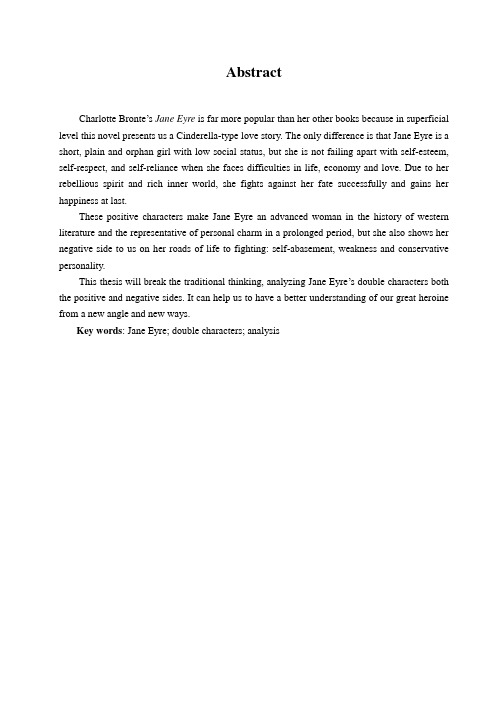
AbstractCharlotte Bronte’s Jane Eyre is far more popular than her other books because in superficial level this novel presents us a Cinderella-type love story. The only difference is that Jane Eyre is a short, plain and orphan girl with low social status, but she is not failing apart with self-esteem, self-respect, and self-reliance when she faces difficulties in life, economy and love. Due to her rebellious spirit and rich inner world, she fights against her fate successfully and gains her happiness at last.These positive characters make Jane Eyre an advanced woman in the history of western literature and the representative of personal charm in a prolonged period, but she also shows her negative side to us on her roads of life to fighting: self-abasement, weakness and conservative personality.This thesis will break the traditional thinking, analyzing Jane Eyre’s double characters both the positive and negative sides. It can help us to have a better understanding of our great heroine from a new angle and new ways.Key words: Jane Eyre; double characters; analysis中文摘要夏洛蒂勃朗特的《简爱》因其灰姑娘似的爱情童话故事而一直享有广泛的读者群。
伦理学视角下简爱多重性格分析

伦理学视角下简爱多重性格分析夏洛蒂·勃朗特的《简·爱》是一部经典的英国文学作品,讲述了女主角简·爱在英国维多利亚时代的成长故事。
简·爱作为小说中的主人公,塑造了一个复杂多变的性格,她的个性既坚毅又敏感,既独立又渴望被爱。
从伦理学的角度来看,简·爱的多重性格具有深刻的意义,对其进行分析有助于我们理解她的成长过程,以及小说所展现的伦理价值观。
我们可以从道德发展的角度来分析简·爱的性格。
在小说中,简·爱成长于一个贫困的家庭,她从小就经历了孤独和困苦。
这种环境造就了她坚强和独立的性格特点,她学会了依靠自己去应对生活中的各种挑战。
当她来到桑菲尔德庄园成为罗彻斯特先生的家庭教师时,她也展现出了她的温柔和敏感一面。
她对孩子们的关爱以及她对罗彻斯特先生的感情,都表现出她内心深处的善良和怜悯之心。
从伦理学的角度来看,简·爱的性格发展呈现出一个道德意识与同情心并存的状态,这种多重性格对她的成长和生活起着重要的作用。
简·爱的性格也体现了她对自由和自主的追求。
在小说中,简·爱一直都渴望着获得自己的自由和独立。
当她与罗彻斯特先生相爱时,她并没有因为对方的地位和财富而放弃自己,而是坚持选择了离开桑菲尔德庄园,选择了追求自己的自由和尊严。
即使在面临与罗彻斯特先生结婚的机会时,她也不愿意成为对方的附庸,而是选择了离开,重新开始自己的生活。
在这个过程中,简·爱展现了她坚定的性格和对自由的追求,她不愿意受到外界的束缚和压制,坚持追求自己内心的真实和自由。
这种对自由和独立的追求在伦理学上具有重要的意义,它反映了个体在道德选择和行为决策中,对自由和尊严的不懈追求。
简·爱的多重性格体现了她对道德发展、自由和独立、平等和正义的追求,这些特点使得她在小说中成为一个充满魅力和内涵的女性形象。
从伦理学的角度来看,简·爱的性格所体现出的多重面向,不仅丰富了小说的人物形象,更在道德、自由和正义等方面提出了深刻的思考和挑战。
- 1、下载文档前请自行甄别文档内容的完整性,平台不提供额外的编辑、内容补充、找答案等附加服务。
- 2、"仅部分预览"的文档,不可在线预览部分如存在完整性等问题,可反馈申请退款(可完整预览的文档不适用该条件!)。
- 3、如文档侵犯您的权益,请联系客服反馈,我们会尽快为您处理(人工客服工作时间:9:00-18:30)。
在被马克思誉为“辉煌一派”的英国四个现实主义小说家中,夏洛蒂以其“激情”的文风笔调稳稳占据一席。
读过她的作品,我们便会觉得“几乎每一页上都有激情笼罩和爆发”,“夏洛蒂在自己心中储存的激情,足够十个人的容量,足够写出充满一个图书馆的小说”。
英国当代评论家丹奈的这一评论并非言过其实。
可叹的是夏洛蒂没有跨过豪渥斯的第四十个寒冬,并没能把她的激情全部释放出来。
然而我们在简爱身上却能找到作者所倾注的全身心的激情。
她以亲切感人的笔调,并以主人公和读者直接谈话的方式,来叙述一个既无姿色又无财产的小资产阶级知志妇女简爱,她靠着独立的人格力量,无所畏惧面对各种艰难险阻和精神折磨,她敢于反抗,从而成为在社会上自重、在生活上自立、在婚姻恋爱上自主的强者。
尤其在情节发展的关键时刻,让主人公自我解剖内心世界,向读者展示生活的灵魂,从而引起读者对简爱的真切感情。
现代评论界大多数研究者都是从小资产阶级妇女解放的角度来评价简爱的,对于这一点我们应该肯定,这也是简爱具有新意的一个方面,她代表了女性强烈的反抗呼声,也正因为如此,便赋予了简爱性格的一面——烈性如火。
全书激荡着妇女对男性压迫者的愤怒抗议和要求男女平等的呼声。
而世间万事万物都是矛盾的结合体,夏洛蒂笔下的简爱也不例外。
她既渴望别人爱自己,也愿意去爱别人。
她说:“我知道我应该看重自己,可这还不够,要是别人不爱我,那我宁可死掉。
”作为社会的人简爱向社会发动了攻势,表达了自己的思想,揭露了社会的不公,而作为自然的人简爱也有着女性天然的感情,这种感情不能由任何外在因素而抹杀,社会的人与自然的人总是结合于一体的,因而柔情必然是简爱性格的组成部分。
也因为如此,我们在简爱的刚烈性格之中不经意间总能发现她的柔情。
全书中这种水与火的交融激荡在简爱的心中,她以爱憎分明的态度去面对个人的生活、工作、爱情、婚姻家庭之类的凡人琐事,也正是简爱的这种水火性格,最能引起永远是占绝大多数的琐事缠身的凡人的共鸣。
简爱烈性如火的反叛性格是从她的几次出走一步一步定型的。
第一次出走是选择离开盖茨海德府去洛伍德学校。
小小的简爱虽然还没有自立的能力,但她不能忍受舅妈家那种被压迫的生活环境,她毅然选择了一个陌生的环境,这对于一个孩童来说需要多么大的勇气,小简爱的这种烈性性格在此时已初见端倪。
她“像所有反抗的奴隶一样,在绝望中决定豁出去了”。
大骂表兄是“杀人犯”,还和他对打起来,被关进恐怖的红房子中她则愤愤不平地喊出:“不公平——不平啊!”对于她的舅妈,她则说:“我要反抗。
”说她“坏透了”,“心肠毒得很”,从而“有了一种前所未有的自由感和胜利感”,但接着又作了自省自责,觉得这“又暖又醇”的报复滋味很快就变得“又涩又苦”,这说明简爱的另一面——渴望得到爱也想去爱别人,而不是这种既遭人恨又恨人的处境。
她对贝茜这样一个下女给予了自己的爱,她以“两条胳膊搂住她”,“互相拥抱”,分别时“搂着贝茜的脖子连连吻着”,读到这些细节时我们就会体会到简爱内心细腻的感情。
第二次是从洛伍德学校到桑菲尔德府。
她对八年的生活常规感到厌倦,她的个性中往日的激情又占了上风,她几近绝望地喊出:“我向往自由,我渴望自由……至少赐给我一份新的工作吧!”于是她毅然登了广告应聘去桑菲尔德。
这一阶段简爱的性格有了发展。
她用剑一样的目光审判着慈善学校日常生活中种种欺弱怕硬的丑恶行为,特别从道义上鄙视那个贪婪、伪善,以虐待孤儿为营生的卑陋小暴君勃洛克赫斯特校长。
特别值得一提的是当海伦受到惩罚,把“邋遢”两字的纸板缚在额头上时,简爱跑到海伦跟前,“把那纸板一把扯下扔进火里。
整整一天她没能发出的怒火一直在我的心中燃烧,大颗大颗的热泪不断地灼痛我的双颊”。
这短短的一段把简爱心中急切的爱与无比的恨淋漓尽致地表现出来。
简爱以难以扑灭的怒火,烧毁纸板来表达对海伦深沉的爱,而实际上她的怒火已蔓延到了那个卑琐的环境,透露出对整个社会不满,也折射出强烈的时代光芒。
第三次是简爱在经历了爱情的挫折后出走。
这一时期最能体现简爱的双重性格。
首先是言行与内心的对立统一。
简爱在言行上仍时时处处从容不迫,凛然不可侵犯,宛如一尊高傲矜持的大理石雕像,并没有轻易表露自己内心的爱,而以其独立自尊的人格来包裹着内心的柔情。
其次,在表达爱时,简爱最先表达的仍是自己强烈的个性,她义正词严地对罗彻斯特说:“你以为因为我穷、低微、不美、矮小,我就没有灵魂,没有心吗?——你想错了!——我跟你一样有灵魂,一也完全一样有一颗心!……我现在不是凭着习俗、常规,甚至也不是凭着肉体凡胎跟你交谈,而是我的心灵在跟你的心灵对话,就好像我们都已离开人世,两人平等地一同站在上帝跟前——因为我们本来就是平等的!”而也正是这种刚正不阿、坚强勇敢、傲对权势的刚烈性格像火一样融化了罗彻斯特的精神世界,打开了他封闭己久的心扉,也使罗彻斯特在此刻认定简爱就是他心目中的妻子。
我们再看看在婚礼前选购衣物一段,简爱以自己的原则喜好来决定自己的事,而没有在爱情面前迷失自己,放弃自我,不愿花枝招展地成为罗彻斯特的点缀物和私人物品。
在简爱看来爱是不需要外在形式束缚的,她鄙视世俗妇女的爱情观,她追求的是更高的精神的爱,使我们不得不对这个单薄的女性产生敬佩之情。
面对罗彻斯特真诚的爱和请求原谅时,简爱的内心独白是这样的:“我在当时当地就原谅了他,他的目光中流露出那么深深的悔恨,他的语气中饱含着那么真挚的同情,他的风度中显示出那样的男子气概,而且在他的整个神情举止中都流露出那么忠贞不渝的爱情——我完全原谅了他,不过不是诉诸语言,也不是形之于表情,而只是深藏在我的心底”。
她内心的柔情被如火的个性压抑着,她以几个连续的“是的”、“是的”来回答爱人,更加坚定地选择自己的人生道路,追求独立的自我仍然是简爱不懈的追求,她选择了第三次出走。
总之,我们在疯狂的背后看到了一个女人的挣扎与反抗,听到了一个女人凄厉的呼喊。
其实伯莎是简的另一个自我。
这个自我被禁锢在简思想的堡垒中,夏洛蒂通过伯莎义无反顾、同归于尽的反抗,来达到简反抗精神的高潮。
简在伯莎的身上看到了自己将来的命运,或者说看到了大多数妇女的命运,作家给伯莎安排悲剧性角色,让简的烈性反抗性格从柔情中爆发出来,更具冲击力。
火也象征着这种反抗精神必然以无可阻挡之势去烧毁一切禁锢。
我们再来看简的最后一次出走。
简忍受不了圣约翰以宗教的名义来束缚自己、控制自己,不愿成为传道的工具,她几次拒绝他的求婚,但她善良温柔的心却抵不过圣约翰的那份温柔。
书中简在心中说道:“哦,那份温柔!它比强迫来不知要有力多少啊!我能够顶住圣约翰的愤怒,而在他温和的态度下,我却软得像根芦苇。
”但简在罗彻斯特心灵的呼唤下找回了失去的自我,她不屈的个性又战了上峰,她又义无反顾地走上了自己选择的道路。
从表现妇女意志的角度看,《简爱》的一个特点是把女人作为第一位的、独立存在的人来表现。
通过简来表达性要求独立、自由、平等的呼声。
特别是在爱情方面,夏洛蒂通过简对封建的等级婚姻制度和资产阶级的商品婚姻制度发起了猛攻。
她认为一个人的价值,不决定于门第、财产、身份、资格等外在的非本质因素,而决定于思想、品德、才智、情操等内在的本质。
她用坚决果敢的态度来证明,真正的爱情可以冲破年龄的差距、财富地位的悬殊、身世阅历的迥异等天然的或人为的障碍,只要男女能够达到精神的契合,心灵的沟通。
《简爱》即使在现代世界也有它独特的意义。
即通过简爱这样一个渺小的人物,写出人的价值、人的精神世界的丰富,人(哪怕是孩子)的感情和尊严的不可辱、不可犯,深刻地控诉了践踏人的价值、浪费人的生命的资本主义制度。
她传播了朦胧的意志,在只认现金交易的资产阶级哲学之外,天地间还有一个更高的法则值得人们尊重。
归根结蒂,这是西欧文化中人道主义传统在新的条件下的继续。
简爱的抗议确实起到抨击现存秩序不合理的战斗作用。
尽管那种秩序还在发展当中,如果我们把简爱的精神概括为推崇人格和鄙视一切仗势欺人、道德伪善、趋炎附势、妄自尊大等卑劣心理的反抗精神,那么显然,《简爱》这部作品的价值也必不会被磨灭。
特别是她的自重精神和自我意志对于当今女性也有激励作用。
社会在发展,时代在进步,对女性的要求也越来越高,越来越残酷的竞争对女性也是一个极大的挑战,但也是证明自己的一个机会,这就要求女性要有自我意志,形成独立人格,不能自轻自贱,只有看重自己,相信自己,充实自己才能争得社会的一席之地。
夏洛蒂在艺术手法上打破了自古沿袭下来的框框,即爱情故事中男主人公多半是少年英俊,女主人公必定是年轻美貌的一成不变的公式。
简爱这个平凡的女性,她的心灵那么丰富而有深度,她的激情那么有感染力,她的形象显示出那么高超的艺术美,相形之下一些作家笔下的丽姝佳人都不免黯然失色。
夏洛蒂的这个尝试是现实主义艺术方法的一个创新。
她推倒了文学中爱情王国历来有美人占领的惯例,把爱情的内容由男女互慕美色提升到心灵契合的更高境界。
她在构思《简爱》的过程中,曾和两个妹妹讨论过女主人公的容貌问题,妹妹们认为除非把女主人公写成美丽的,否则无法使读者感兴趣,她说:“我要证明你们错了。
我要创造一个女主人公给你们看。
她像我一样矮小难看,可是她将和你们的女主人公一样会叫人感兴趣。
”诚然,许多以爱情为主题的杰出作品中女主人公兼有美貌和性格而令人难忘,可是像简这样纯然以性格抓住人心的人物,则属少见。
作者还注意对人物性格的发展变化及矛盾斗争,特别运用心灵独白和象征手法。
如:简的性格经历了童年、少年、青年、成年几个阶段,并通过主人公的内心展现矛盾斗争和对外界事物的感受。
有些现代评论家认为夏洛蒂是英国第一位主观主义小说家,是詹姆斯、乔伊斯等个人意志小说家的先驱。
同时《简爱》也是一部现实主义与浪漫主义相结合的作品。
小说真实再现了小人物简30年的坎坷遭遇和勇敢追求,细腻地叙述了女主人公艰难的生存状态和复杂的心理活动,反对人性的压抑和摧残,赞扬了妇女独立自主、自尊自强的精神,是一部现实主义的作品。
但作品也充分表现了作者的主观理想,抒发了个人热烈的感情,在情节的构建、人物的刻画、心理的揭示和景物的描绘方面却有着丰富的想象力,正是这种浪漫主义的艺术技巧和现实主义手法的交融结合使本书更加生动,更能引起人们的共鸣和联想。
